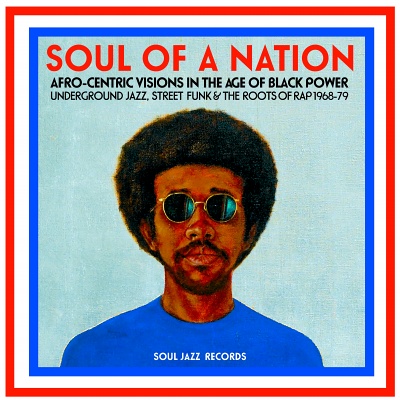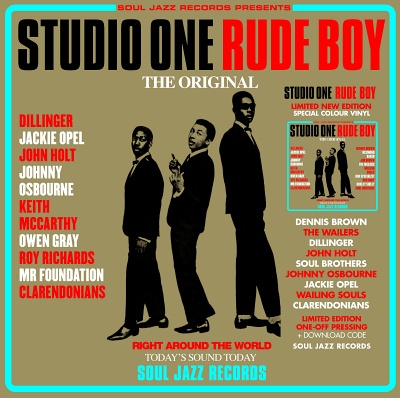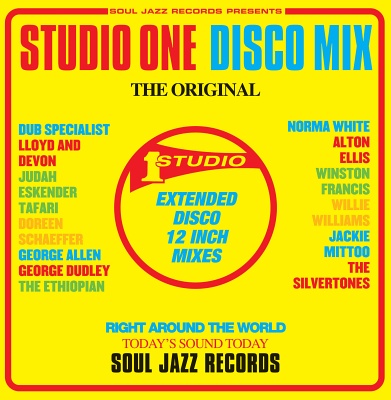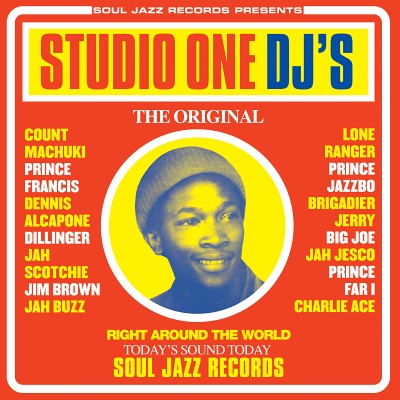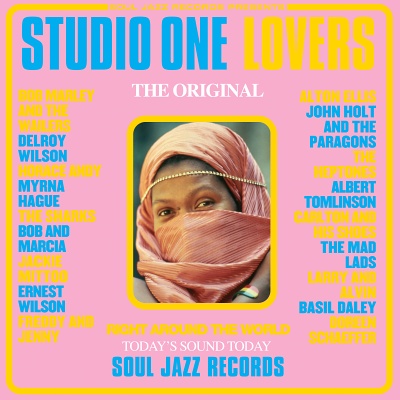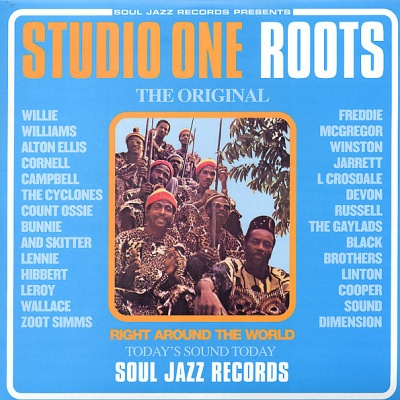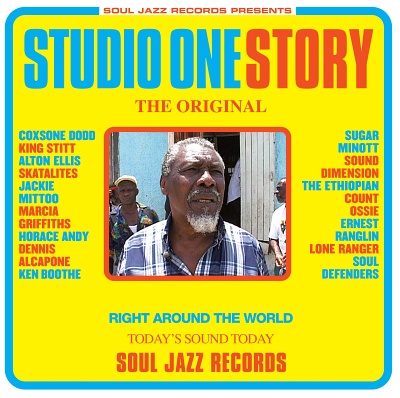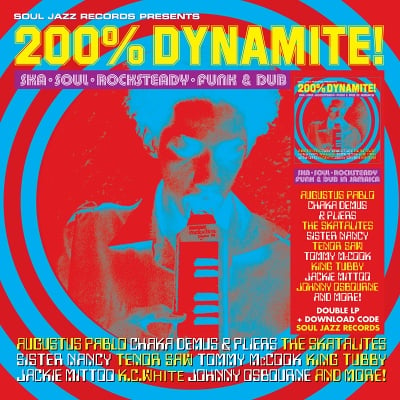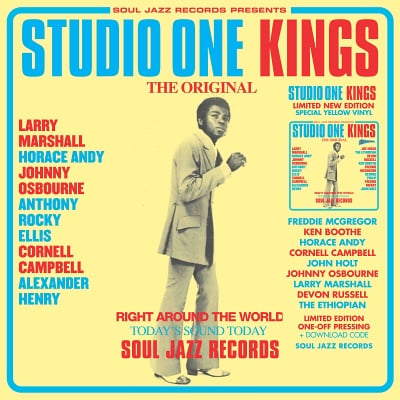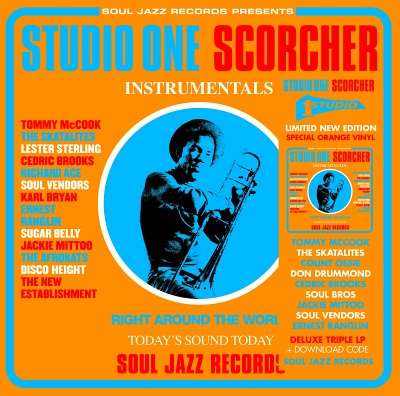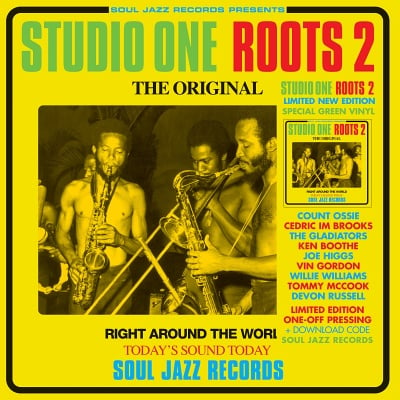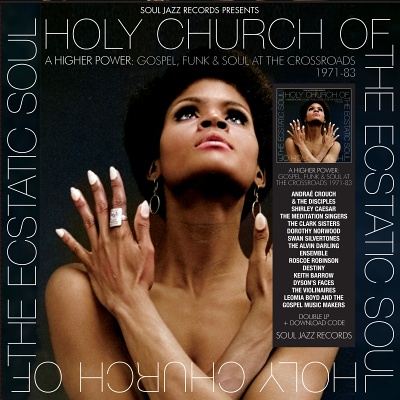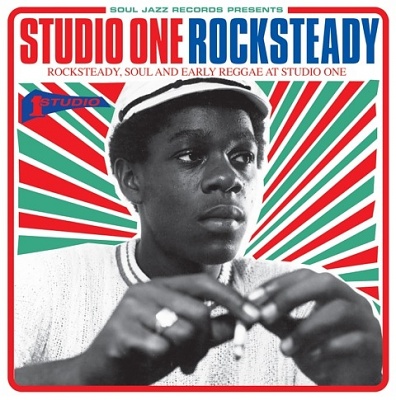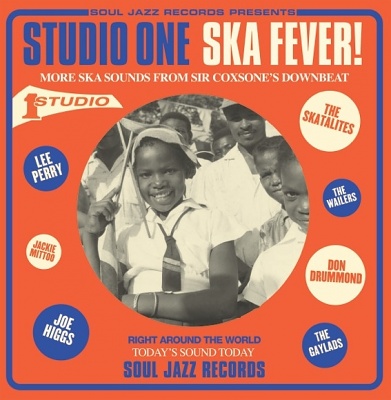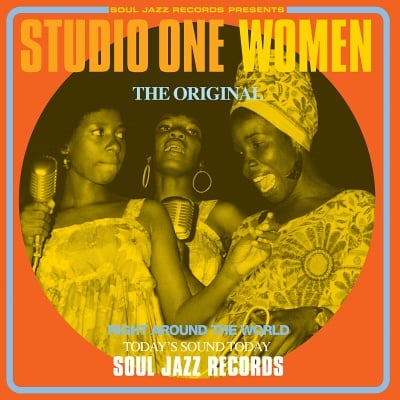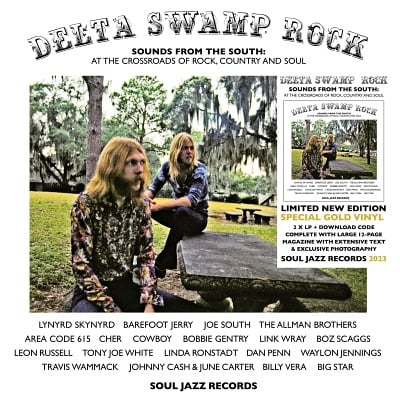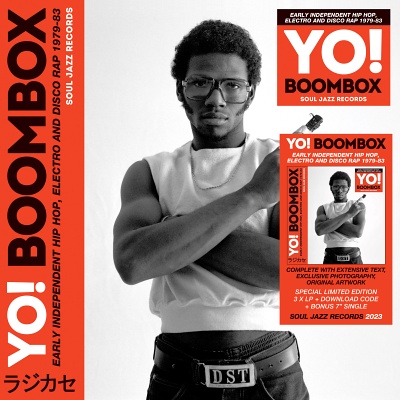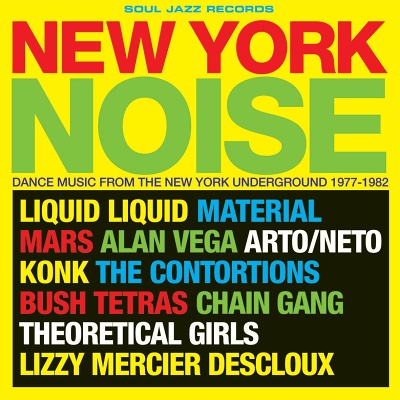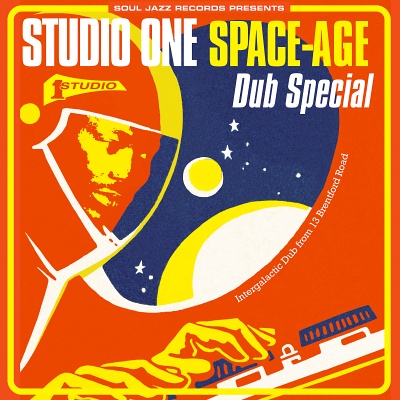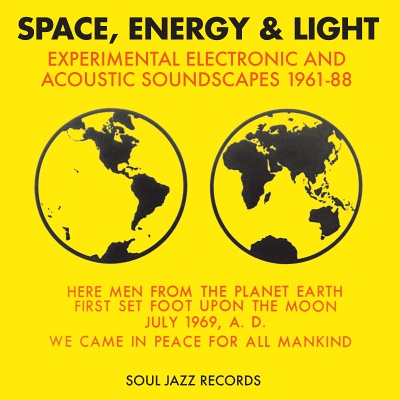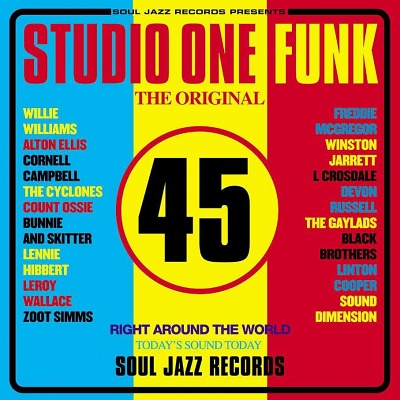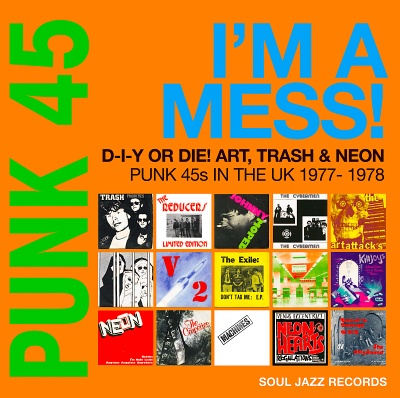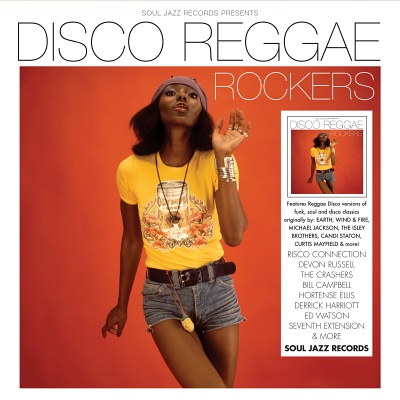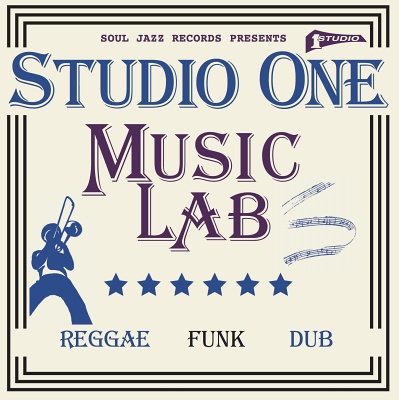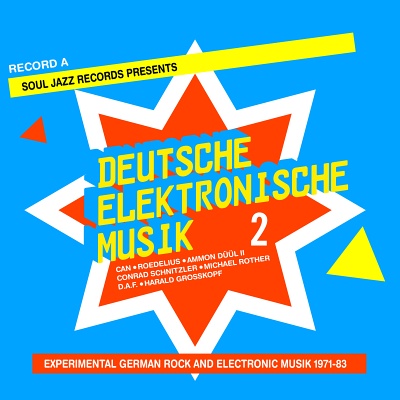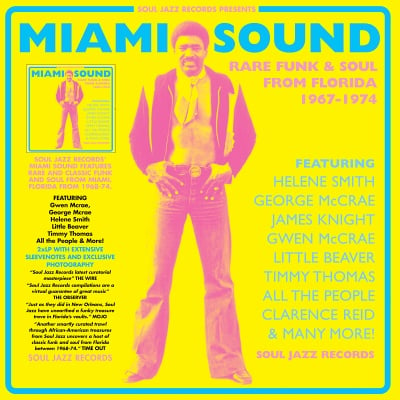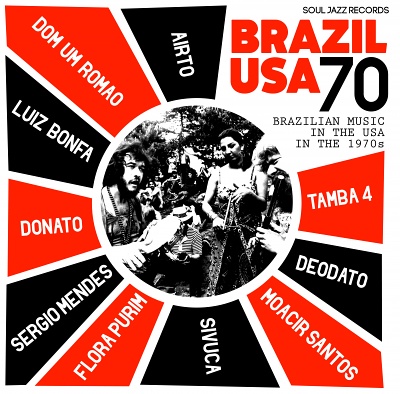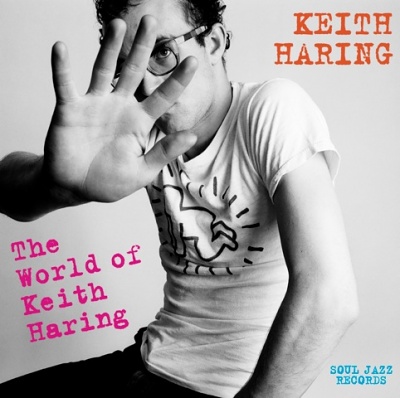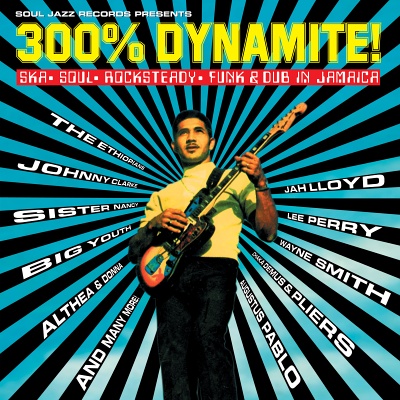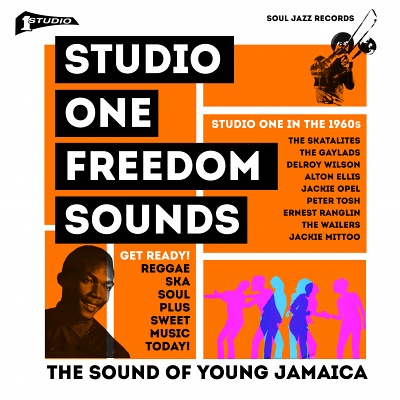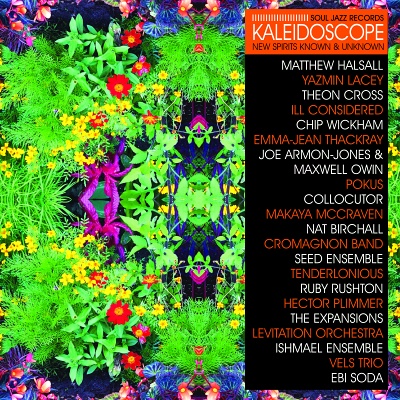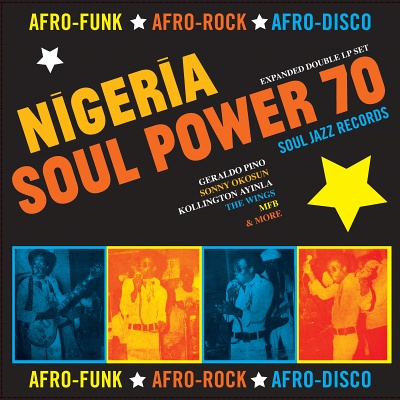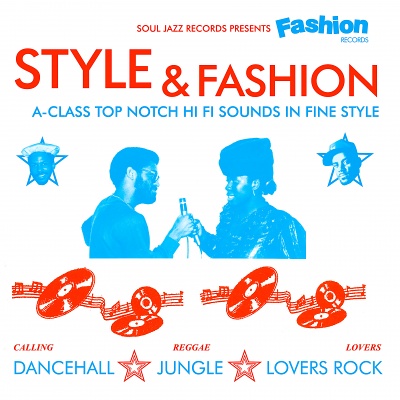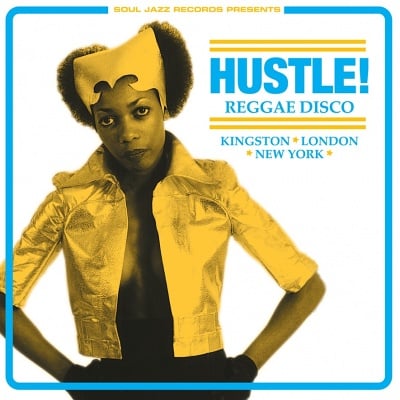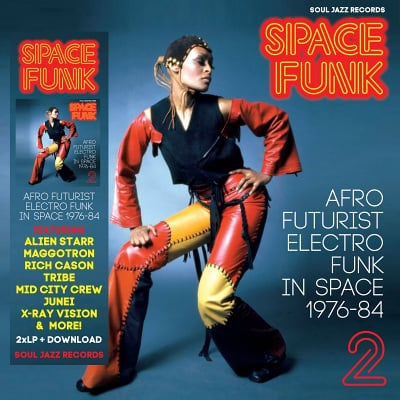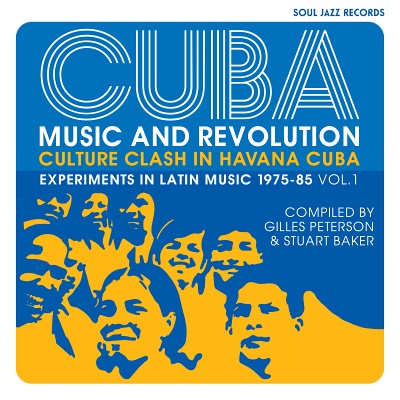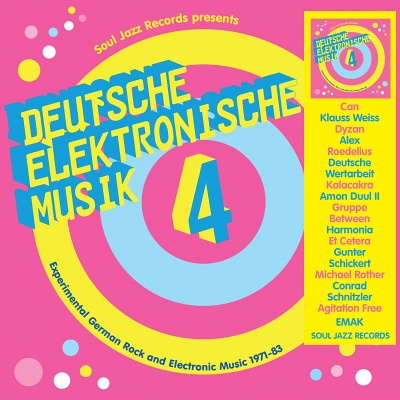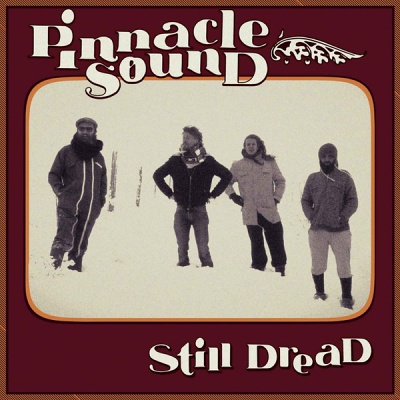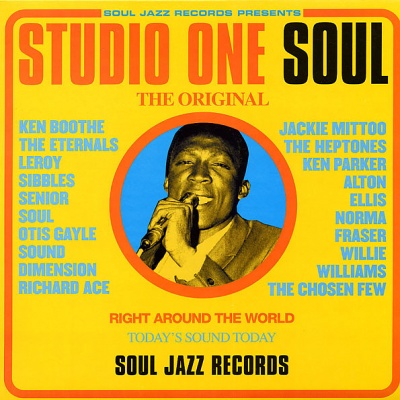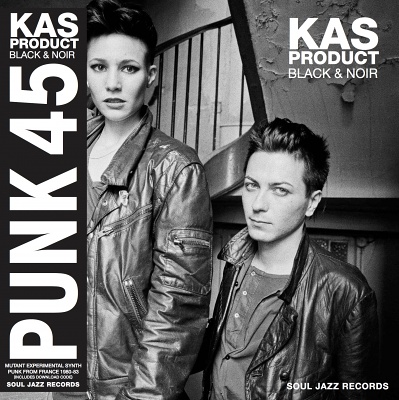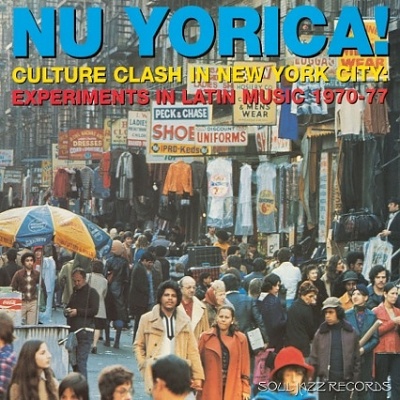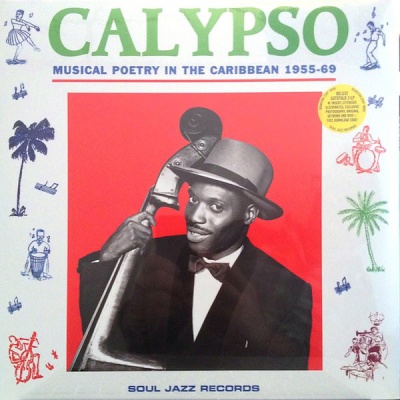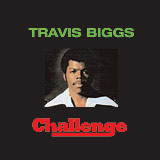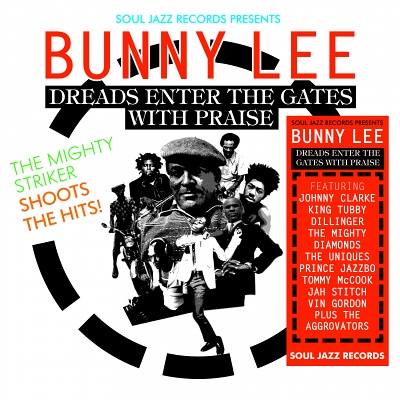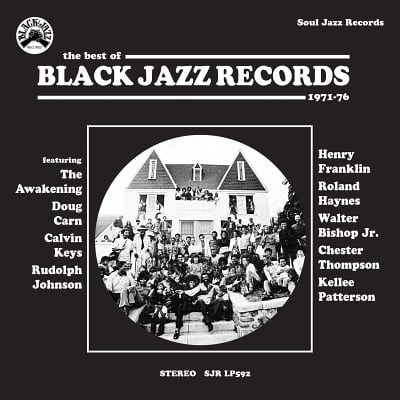
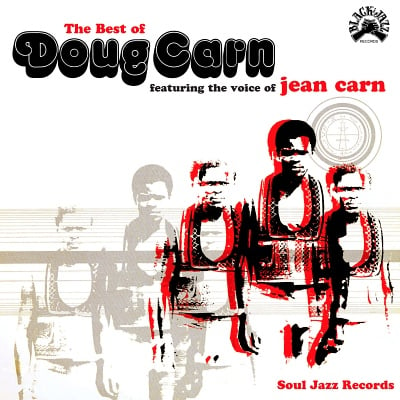
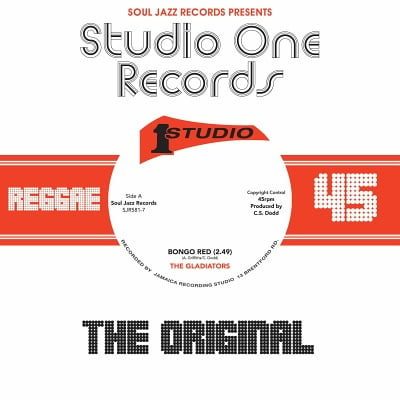
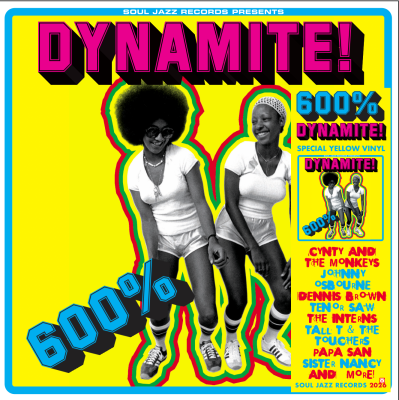
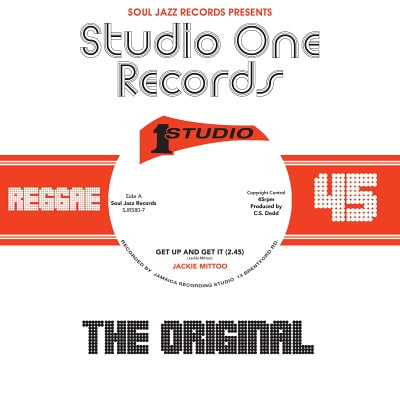
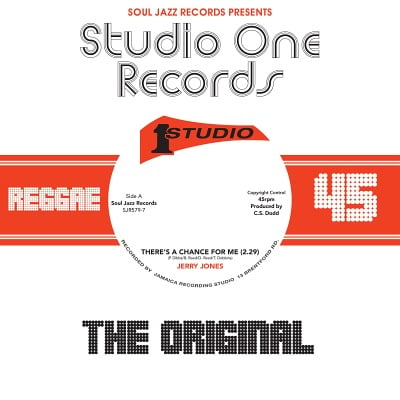
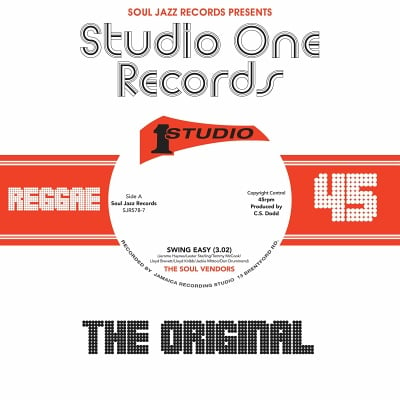
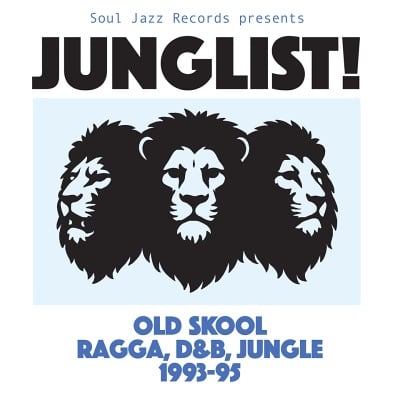
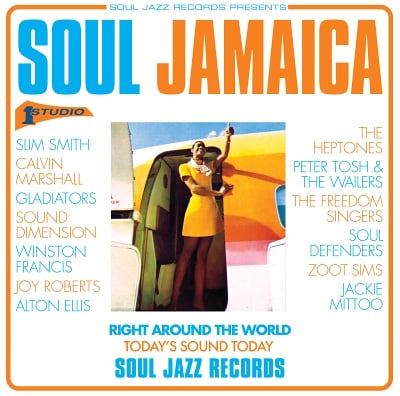
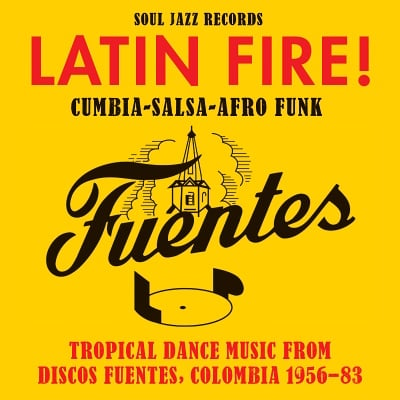
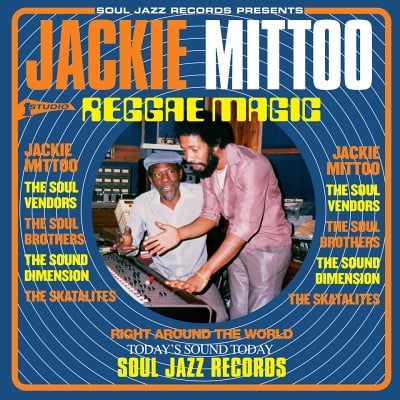
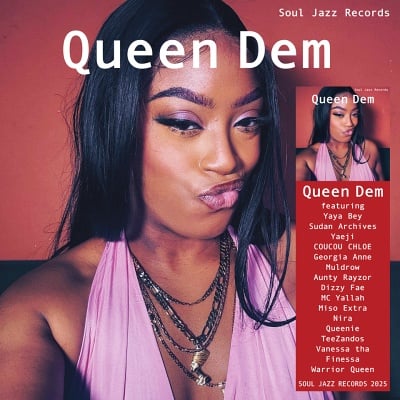
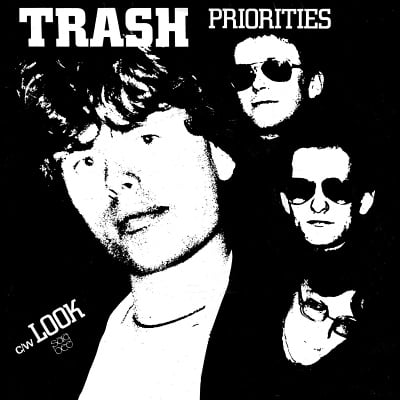
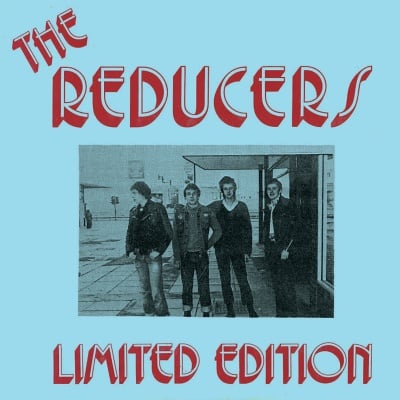
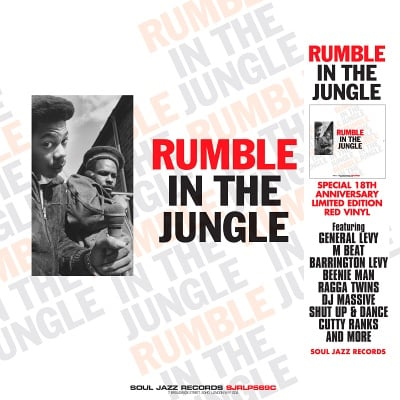
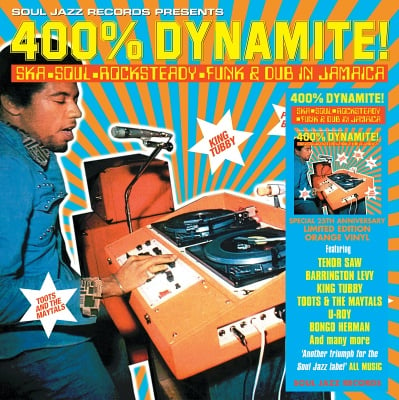
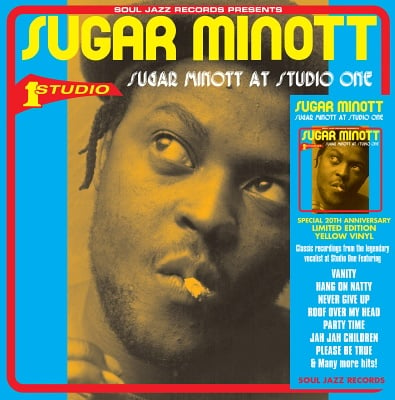
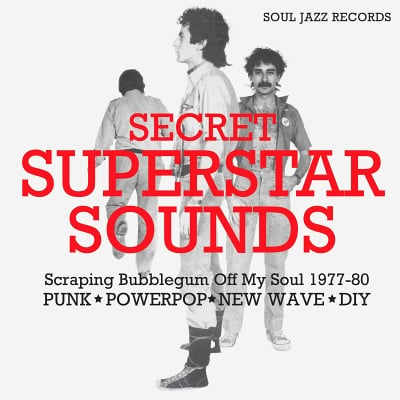
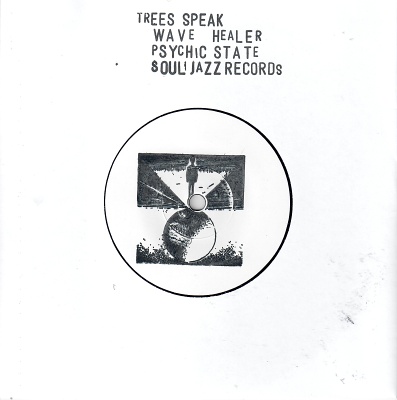
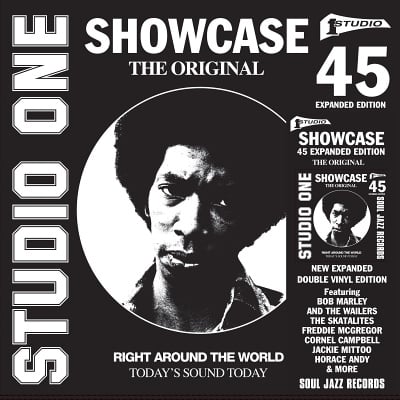
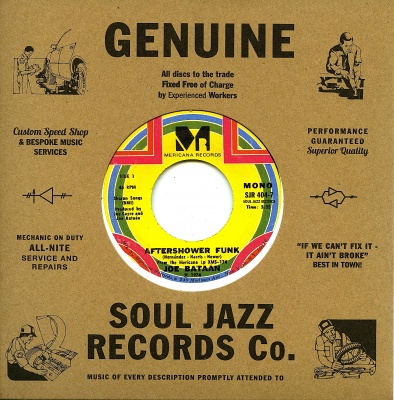
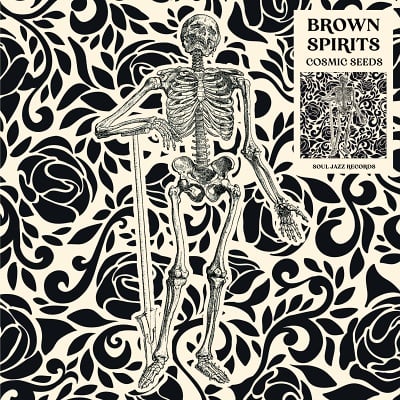
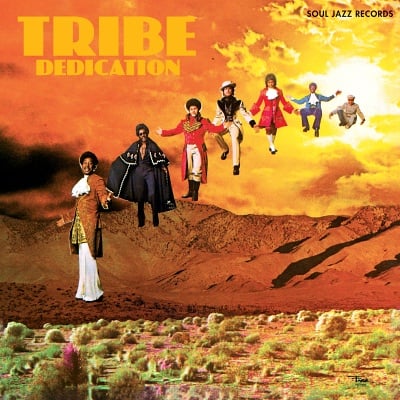
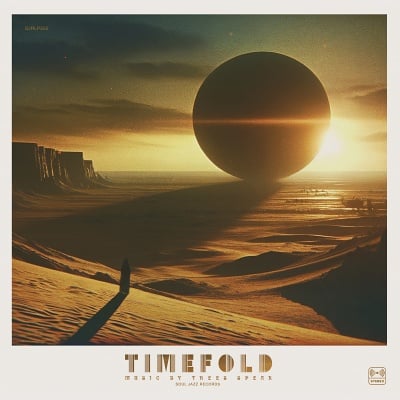
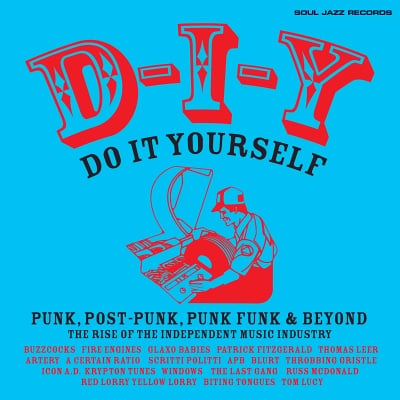
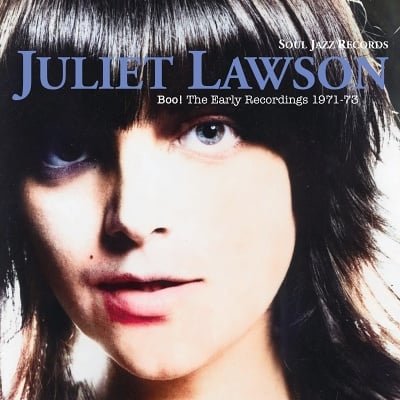
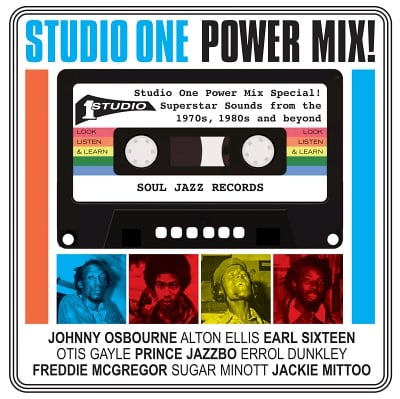
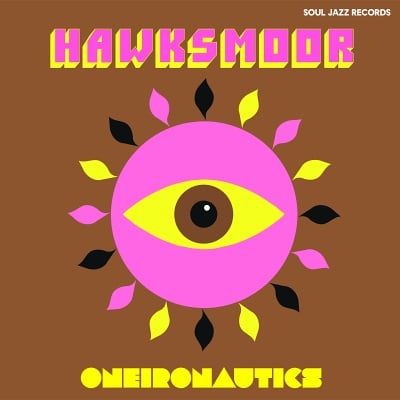
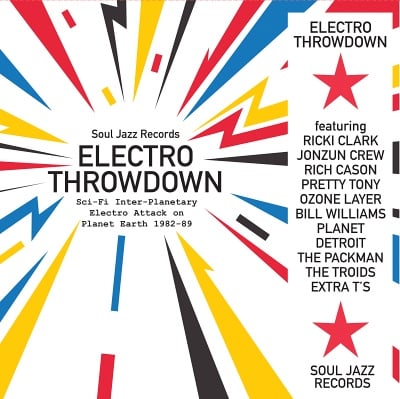
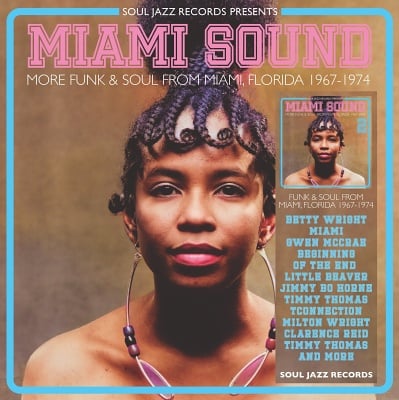
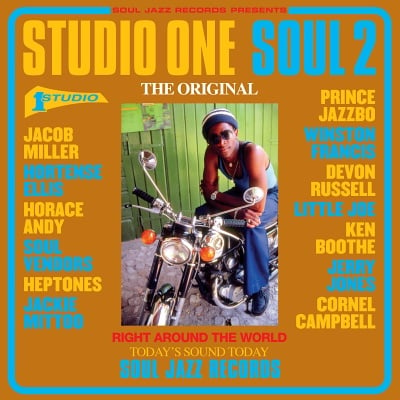
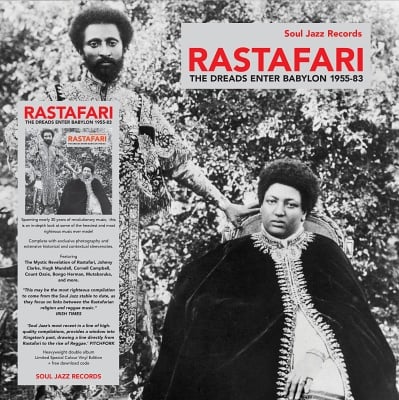
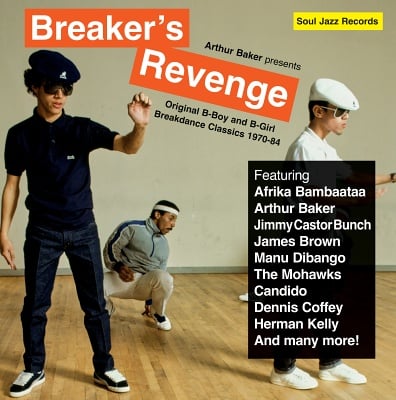
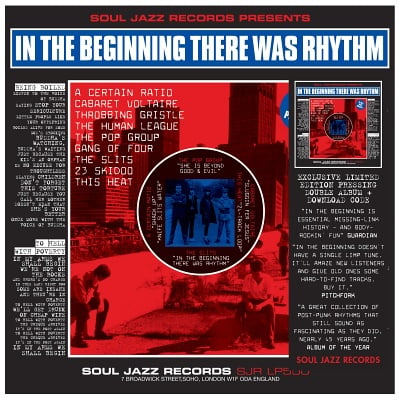
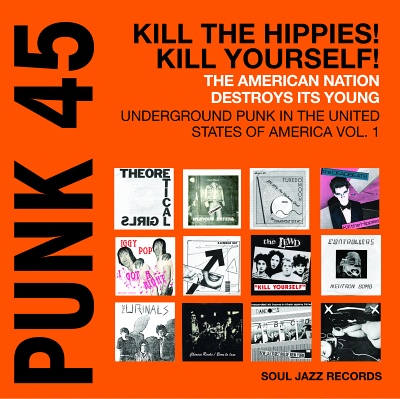
Soul of a Nation 2Jazz is the Teacher, Funk is the Preacher: Afro-Centric Jazz, Street Funk and the Roots of Rap in the Black Power Era 1969-75
Soul Jazz Records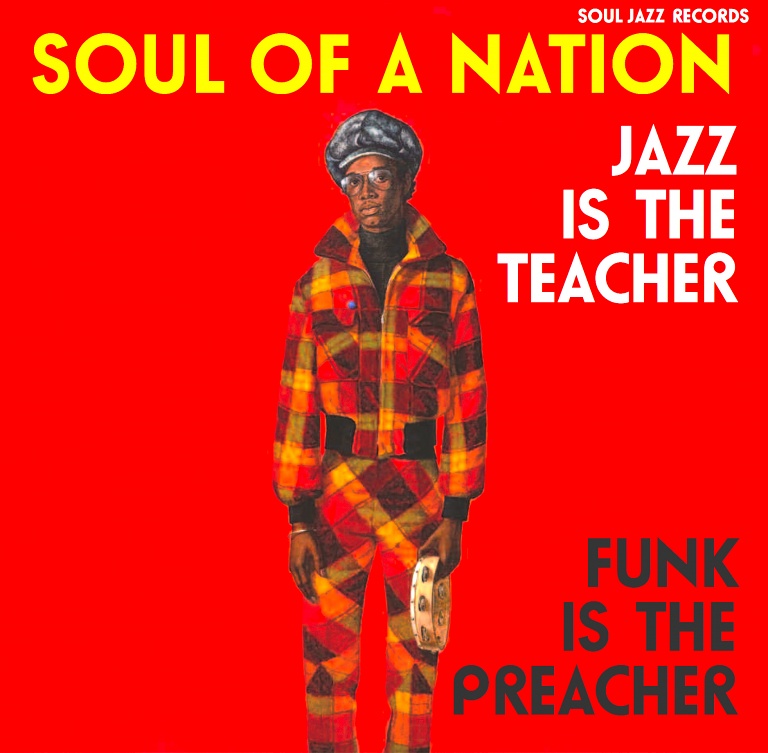
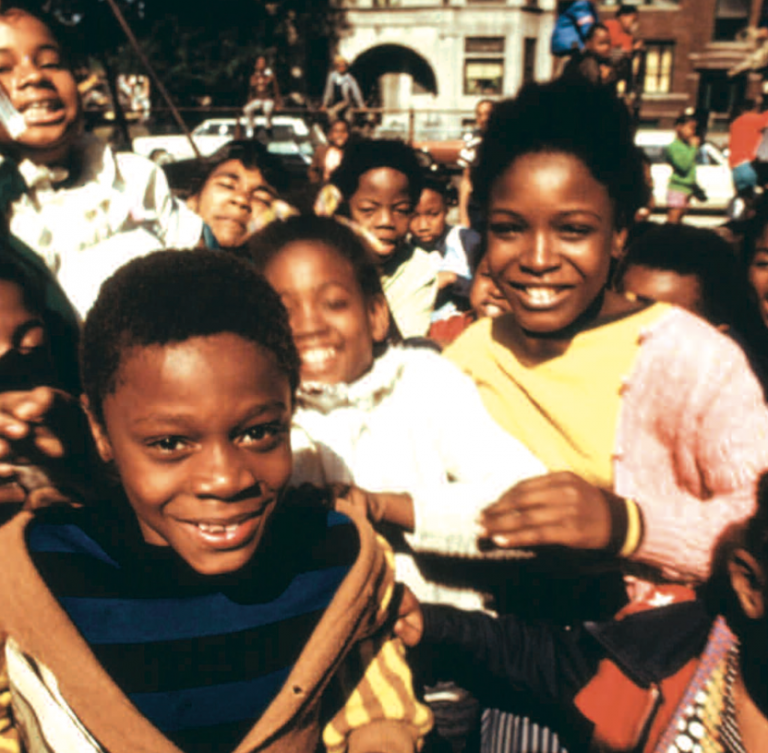
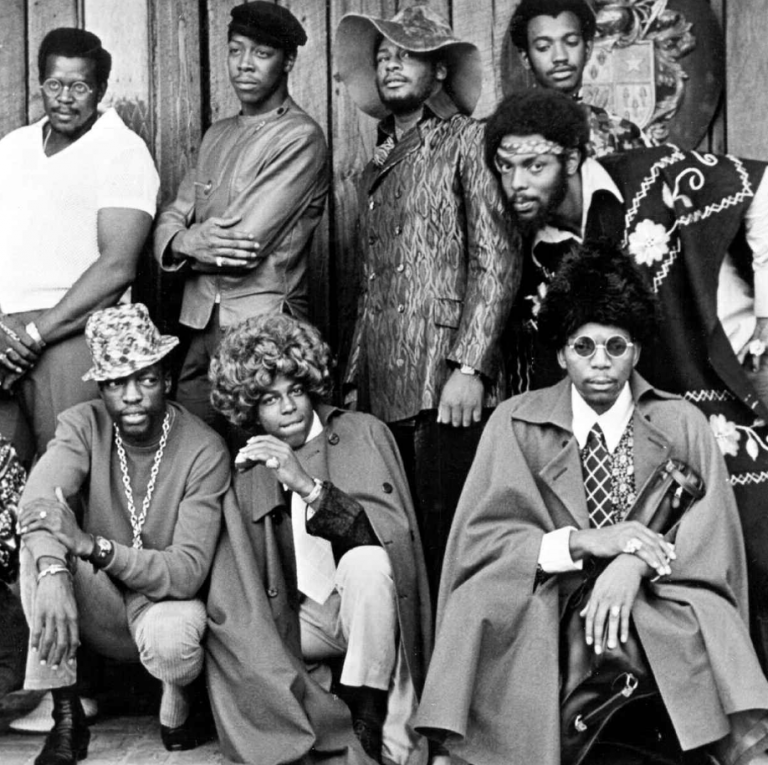
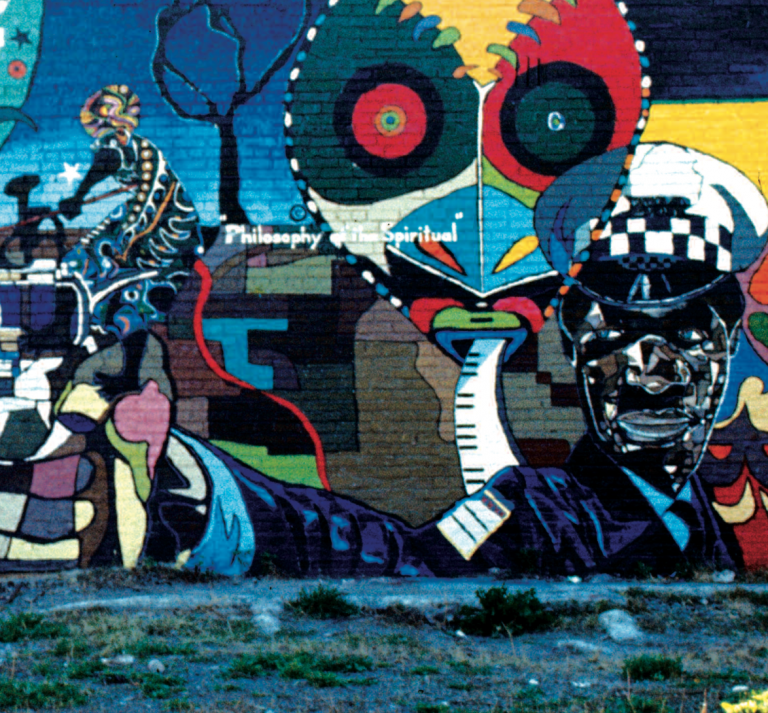
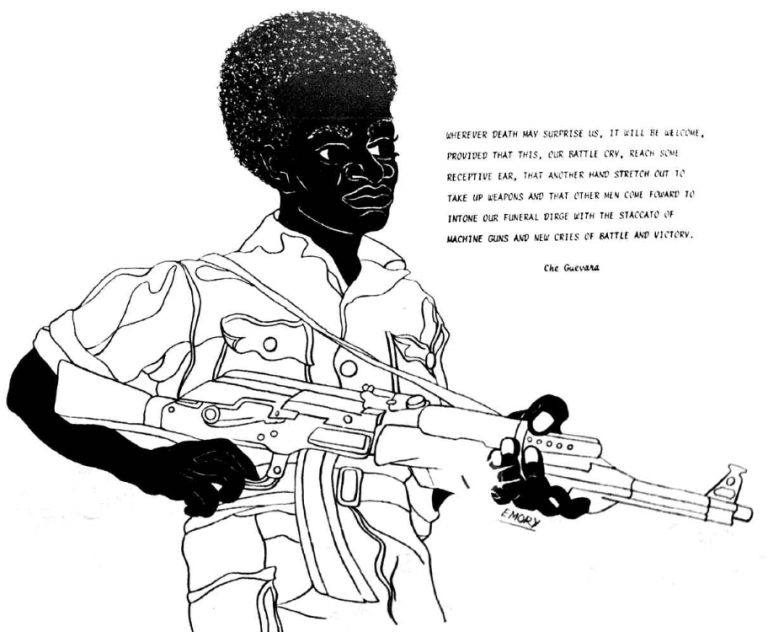
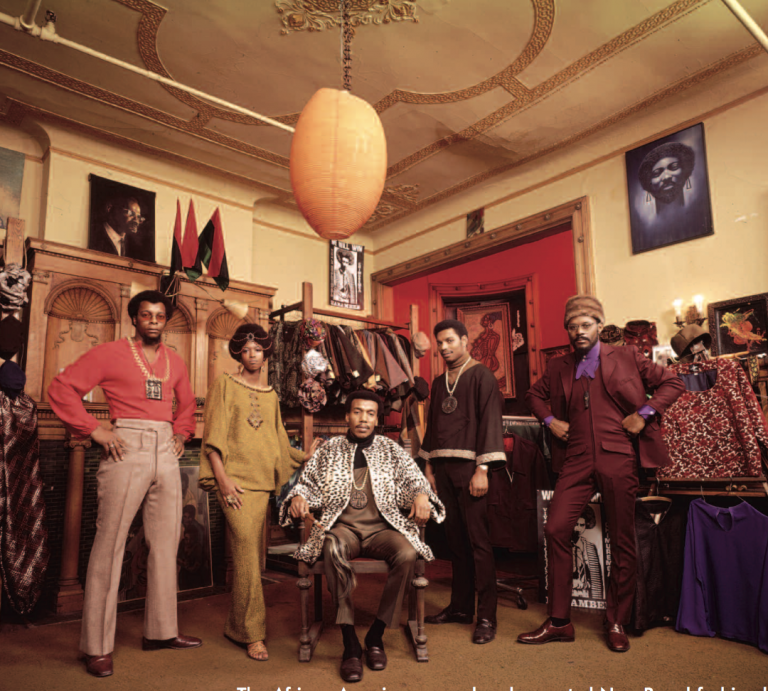
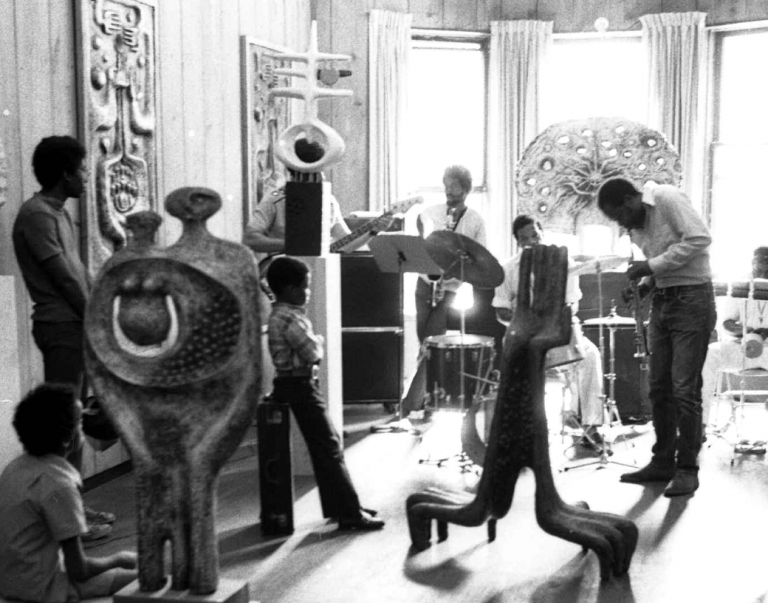
- 3×LP + Download Code SJRLP423£34.00Out of stock Notify me when in stock
- CD SJRCD423£12.00In stockAdd to Bag
- MP3 Release SJRD423£9.99In stockAdd to Bag
- The Art Ensemble Of Chicago – Theme De Yoyo
- The Har-You Percussion Group – Welcome To The Party
- The Pharaohs – Damballa
- Baby Huey – Hard Times
- James Mason – Sweet Power, Your Embrace
- Byron Morris and Unity – Kitty Bey
- Funkadelic – Nappy Dugout
- Rashied Ali & Frank Lowe – Exchange Part 2 (II)
- Gary Bartz NTU Troop – Celestial Blues
- Oneness Of Juju – Space Jungle Funk
- Sarah Webster Fabio – Work It Out
- Tribe (Wendell Harrison and Phillip Ranelin) – Beneficent
- Gil Scott-Heron – Whitey On The Moon
- Don Cherry – Brown Rice
- 1. The Art Ensemble Of Chicago – Theme De Yoyo
- 2. The Har-You Percussion Group – Welcome To The Party
- 3. The Pharaohs – Damballa
- 4. Baby Huey – Hard Times
- 5. James Mason – Sweet Power, Your Embrace
- 6. Byron Morris and Unity – Kitty Bey
- 7. Funkadelic – Nappy Dugout
- 8. Rashied Ali & Frank Lowe – Exchange Part 2 (II)
- 9. Gary Bartz NTU Troop – Celestial Blues
- 10. Oneness Of Juju – Space Jungle Funk
- 11. Sarah Webster Fabio – Work It Out
- 12. Tribe (Wendell Harrison and Phillip Ranelin) – Beneficent
- 13. Gil Scott-Heron – Whitey On The Moon
- 14. Don Cherry – Brown Rice
Soul Jazz Records’ new release ‘Soul of A Nation: Jazz is the Teacher, Funk is the Preacher’ is a powerful new collection of radical jazz, street funk and proto-rap made in the era of Black Power (1969-75).
This is the second ‘Soul of A Nation’ album released by Soul Jazz Records to coincide with the exhibition ‘Soul of a Nation – Art in the Age of Black Power’, critically acclaimed and enormously successful when it opened at the Tate Modern in London last year (as was Soul Jazz Records’ accompanying first album ‘Soul of A Nation – Afro-Centric Visions in the Age of Black Power 1968-79’). The blockbuster international exhibition is now at the Brooklyn Museum, New York and then travels to Los Angeles in 2019.
This new album features a number of important and ground-breaking African-American artists – The Art Ensemble of Chicago, Don Cherry, Funkadelic, Gil Scott-Heron and more – alongside a host of lesser-known artists all of whom in the early 1970s were exploring new Afrocentric poly-rhythmical styles of music – radical jazz, street funk and proto-rap – while at the same time exploring the Black Power and civil-rights inspired notions of self-definition, self-respect and self-empowerment in their own lives.
During this era African-American jazz musicians ripped up traditional definitions – rejecting the term ‘entertainer’ to redefine themselves instead as ‘artists’. They worked outside of the mainstream music industry perceiving this artistic relationship to be fundamentally exploitative and politically flawed. Artists instead formed their own pan-arts community-centric collectives, set up their own record labels, ran concerts in alternative performance spaces – art galleries, parks, lofts, community centres – all as a way of taking control of their own creative destinies.
At the start of 1960s jazz musicians had embarked on an intense period of musical experimentation as artists John Coltrane, Ornette Coleman and Don Cherry sought to dismantle the traditional definitions of jazz by creating new music that broke free from its establishment shackles. By the end of the 1960s, forward-thinking African-American jazz musicians had absorbed the ideas of this radical and avant-garde path but also began to introduce many new elements – not just civil rights concepts of freedom but also black power ideas of self-respect, righteousness and anger.
Their music developed into a radical and intense Afrocentric mix of jazz, funk, soul and street poetry, all in search of a new musical language that could better represent artistic African-American cultural expression.
All of the featured artists here were involved in this search in different ways; A shared sense of Afrocentric collectivism joined the dots between the deep avant-garde experimentalism of The Art Ensemble of Chicago (here featuring soul singer Fontella Bass singing the powerful ‘Theme de Yoyo’) to the hyper funk psychedelia of George Clinton’s Funkadelic.
The poetry of Gil Scott-Heron and Sarah Webster Fabio performed with a backdrop of street funk and heavyweight percussion laid down the template for the birth of rap. The Har-You Percussion Group, a group of young Harlem teenagers, showed how government-sponsored social initiatives helped create great art and music. Gary Bartz and The Oneness of Juju offer spirituality and cosmology. Collectives like The Pharaohs and Detroit’s Tribe add deep jazz and street funk in equal measures. And so on.
Influenced and radicalised by Black Power and civil rights, all these artists were involved in creating – in the words of the Art Ensemble of Chicago – ‘Great Black Music: Ancient to Future.’
This album is available as heavyweight triple vinyl (+free download), full and extensive text, exclusive photography, with house inners, and as deluxe CD with slipcase, 40-page outsize booklet and jewel case.
- Gil Scott-Heron – The Revolution Will Not Be Televised
- Mandingo Griot Society with Don Cherry – Sounds From The Bush
- Roy Ayers Ubiquity – Red, Black and Green
- Philip Cohran and The Artistic Heritage Ensemble – Malcolm X
- Sarah Webster Fabio – Sweet Songs
- Phil Ranelin – Vibes From The Tribe
- Horace Tapscott with the Pan Afrikan Peoples Arkestra – Desert Fairy Princess
- David McKnight – Strong Men
- Joe Henderson – Black Narcissus
- Oneness Of Juju – African Rhythms
- Doug Carn – Suratal Ihklas
- Duke Edwards and The Young Ones – Is It Too Late ?
- Carlos Garnett – Mother Of The Future
- 1. Gil Scott-Heron – The Revolution Will Not Be Televised
- 2. Mandingo Griot Society with Don Cherry – Sounds From The Bush
- 3. Roy Ayers Ubiquity – Red, Black and Green
- View full info and tracklisting
- 2xLP + Download Code SJRLP393£26.00Out of stock Notify me when in stock
- CD SJRCD393£12.00In stockAdd to Bag
- MP3 Release SJRD393£9.99In stockAdd to Bag
- COUCOU CHLOE – Nobody
- Yaeji featuring Nappy Nina – Money Can't Buy
- TeeZandos – Lioness
- Sudan Archives – Selfish Soul
- Miso Extra – 1013
- Aunty Rayzor – Kuku Corona
- Yaya Bey – Meet Me In Brooklyn
- COUCOU CHLOE – Pokerface
- Queenie – Okay Twin
- Yaya Bey – Best Thang
- MC Yallah x Debmaster – Kubali
- Dizzy Fae – Solo
- Vanessa Tha Finessa – Bad Bitch Steppin’
- Dubbing Sun & Blue Hill featuring Warrior Queen – Armageddon
- Georgia Anne Muldrow – Big Mama Africa Jam
- Miso Extra featuring NAYANA IZ – Great Taste
- Nira – Train Of Love
- 1. COUCOU CHLOE – Nobody
- 2. Yaeji featuring Nappy Nina – Money Can't Buy
- 3. TeeZandos – Lioness
- View full info and tracklisting
- 2xLP + Download Code SJRLP575£28.00In stockAdd to Bag
- CD SJRCD575£12.00In stockAdd to Bag
- MP3 Release SJRD575£9.99In stockAdd to Bag
- M-Beat Featuring General Levy – Incredible
- Barrington Levy & Beenie Man – Under Mi Sensi (X Project Remix)
- The Ragga Twins – Ragga Trip
- Ninjaman, Bounty Killer, Beenie Man & Ninja Ford – Bad Boy Lick A New Shot (Jungle Bullet)
- The Source – Rude Boy State Of Mind
- Shut Up And Dance – No Doubt
- DJ Massive – Final Conflict
- Asher Senator – One Bible
- Poison Chang – Press The Trigger (Half Breed Remix)
- The Ragga Twins – Illegal Gunshot
- Ben Intellect Featuring Ragga G – Oh Jungle
- Cutty Ranks – Limb By Limb (DJ SS Remix)
- The Ragga Twins – Tan So Back
- 1. M-Beat Featuring General Levy – Incredible
- 2. Barrington Levy & Beenie Man – Under Mi Sensi (X Project Remix)
- 3. The Ragga Twins – Ragga Trip
- View full info and tracklisting
- 2xLP (Coloured Vinyl) + Download Code SJRLP569C£34.00In stockAdd to Bag
- Gobblinz – London
- Plummet Airlines – It's Hard
- Xdreamysts – Right Way Home
- Tours – Language School
- The Squares – No Fear
- The Monitors – Compulsory Fun
- The Meanies – It's True
- Jeff Hill Band – Something’s Wrong With My Baby
- The Squad – 24 Hours
- Krypton Tunes – Limited Vision
- The Zeros – Hungry
- The Wardens – Do So Well
- The Letters – Nobody Loves Me
- The Tunnelrunners – Forever Crying At Love Songs
- Comic Romance – Cry Myself To Sleep
- 1. Gobblinz – London
- 2. Plummet Airlines – It's Hard
- 3. Xdreamysts – Right Way Home
- View full info and tracklisting
- New LP SJRLP571£26.00In stockAdd to Bag
- CD SJRCD571£12.00In stockAdd to Bag
- MP3 Release SJRD571£9.99In stockAdd to Bag
- Freddie McGregor – Beat Down Babylon
- Cornel Campbell – No Man's Land
- Judah Eskender Tafari – Danger In Your Eyes
- Tony & Howie – Fun It Up
- Liberation Group – Namibia
- Winston Francis – Love Me Today, Not Tomorrow
- Roland Alphonso – Jah Shakey
- Joe Higgs – Dinah
- Brown Eagle – Natural Living
- Freddie McKay – So Long, Farewell
- Jackie Mittoo – Mixing
- The Heptones – How Can I Leave You
- The Skatalites – Sudden Destruction
- Lone Ranger – Dance A Fe Cork
- Horace Andy – Mamie Blue
- Johnny Osbourne – Run Up Your Mouth
- Bob Marley and The Wailers – One Love
- The Cables – What Am I To Do
- 1. Freddie McGregor – Beat Down Babylon
- 2. Cornel Campbell – No Man's Land
- 3. Judah Eskender Tafari – Danger In Your Eyes
- View full info and tracklisting
- 2xLP (+ Download Code) SJRLP546£28.00In stockAdd to Bag
- CD SJRCD546£12.00In stockAdd to Bag
- MP3 Release SJRD546£9.99In stockAdd to Bag
- Buzzcocks – Boredom
- Fire Engines – Everything's Roses
- Glaxo Babies – Shake (The Foundations)
- Patrick Fitzgerald – Babysitter
- Russ McDonald – Looking From The Cooking Pot
- Artery – The Slide
- A Certain Ratio – Si Fermir O Grido
- Scritti Politti – Skank Bloc Bologna
- APB – All Your Life With Me
- Blurt – The Fish Needs A Bike
- Icon A.D. – Fight For Peace
- Throbbing Gristle – Distant Dreams (Part Two)
- Krypton Tunes – Coming To See You
- Windows – Creation Rebel
- The Last Gang – Spirit Of Youth
- Thomas Leer – Tight As A Drum
- Red Lorry Yellow Lorry – Paint Your Wagon
- Biting Tongues – You Can Choke Like That
- Tom Lucy – Paris, France
- 1. Buzzcocks – Boredom
- 2. Fire Engines – Everything's Roses
- 3. Glaxo Babies – Shake (The Foundations)
- View full info and tracklisting
- 2xLP (Coloured Vinyl) + Download Code SJRLP552C£28.00In stockAdd to Bag
- MP3 Release SJRD552£8.99In stockAdd to Bag
- Otis Gayle – What You Won't Do For Love
- Earl Sixteen – Love Is A Feeling
- Alton Ellis – Back To Africa
- Prince Jazzbo – Apollo 16
- Johnny Osbourne – Eternal Peace
- Errol Dunkley – Don't Do It
- Omega – Bounty Hunter
- Noel Bailey and Sound Dimension – Wiggle's Diggles
- Freddie McGregor – I Am Ready
- Prince Jazzbo – Imperial I
- Jackie Mittoo – Lovers Rock
- Devon Russell – Swing and Dine
- Sugar Minott – Guidance
- Dolly Man – Trigger Happy
- Nana McLean – A Little Love
- Tyrone Taylor – Rightful Rebel
- Wailing Souls – All Alone
- Sugar Minott – Revelation
- 1. Otis Gayle – What You Won't Do For Love
- 2. Earl Sixteen – Love Is A Feeling
- 3. Alton Ellis – Back To Africa
- View full info and tracklisting
- 2xLP (+ Download Code) SJRLP549£28.00In stockAdd to Bag
- CD SJRCD549£12.00In stockAdd to Bag
- MP3 Release SJRD549£9.99In stockAdd to Bag
- The Rickie Clark Company – Time To Throw Down
- The Troids – Boogie Troids
- The Packman – I'm The Packman
- Pretty Tony – Fix It In The Mix
- Jazaq – All Systems Go
- Rich Cason – Killer Groove
- The Jonzun Crew – We Are The Jonzun Crew
- Ozone Layer – Planetary Deterioration (Electro Mix)
- Bill Williams and Bileo – Robot People
- Extra T's – E.T. Boogie
- Planet Detroit – Invasion From The Planet Detroit
- Professor X – Professor X (Saga)
- Mo-Jo – Jump, Stomp and Twist (Instrumental)
- 1. The Rickie Clark Company – Time To Throw Down
- 2. The Troids – Boogie Troids
- 3. The Packman – I'm The Packman
- View full info and tracklisting
- 2xLP (+ Download Code) SJRLP547£28.00In stockAdd to Bag
- MP3 Release SJRD547£9.99In stockAdd to Bag
- Betty Wright – Clean Up Woman
- Miami – Party Freaks
- Gwen McRae – All This Love That I'm Givin'
- Beginning Of The End – Monkey Tamarind
- Latimore – I Get Lifted
- Raw Soul Express – Burn The Candle
- Chocolateclay – Free (I'll Always Be)
- Betty Wright – I Love The Way You Love
- Little Beaver – Concrete Jungle
- Jimmy 'Bo' Horne – Clean Up Man
- Timmy Thomas – Africano
- Charles Allen – Winterman
- T Connection – Do What You Wanna Do
- Robert Moore – Jimmie Bo Charlie
- Milton Wright – Keep It Up
- Clarence Reid – Ten Tons Of Dynamite
- Timmy Thomas – Why Can't We Live Together
- Little Beaver – We Three
- Paulette Reaves – Do It Again
- Lynn Williams – Kisses, Kisses, Kisses
- 1. Betty Wright – Clean Up Woman
- 2. Miami – Party Freaks
- 3. Gwen McRae – All This Love That I'm Givin'
- View full info and tracklisting
- 2xLP + Download Code SJRLP541£28.00In stockAdd to Bag
- CD SJRCD541£12.00Out of stock Notify me when in stock
- MP3 Release SJRD541£9.99In stockAdd to Bag
- Jacob Miller – Westbound Train
- Hortense Ellis – People Make The World Go Round
- Horace Andy – Ain't No Sunshine
- Soul Vendors – Swing Easy
- The Heptones – Choice Of Colours
- Jackie Mittoo & The Brentford Disco Set – Choice Of Music Part 2
- Prinze Jazzbo – Fool For Love
- Cornell Campbell – Ten To One
- Winston Francis – Don't Change
- Jackie Mittoo – Jumping Jehosophat
- Tony Gregory – Get Out Of My Life Woman
- Dub Specialist – Darker Block
- Little Joe – Red Robe
- Devon Russell – Make Me Beleive In You
- Jerry Jones – Compared To What
- Ken Boothe – Thinking
- Anthony Creary – Land Call Africa
- Jackie Mittoo – Fancy Pants
- 1. Jacob Miller – Westbound Train
- 2. Hortense Ellis – People Make The World Go Round
- 3. Horace Andy – Ain't No Sunshine
- View full info and tracklisting
- New 2×LP (Coloured Vinyl) + Download Code SJRLP556C£28.00In stockAdd to Bag
- CD SJRCD556£12.00In stockAdd to Bag
- MP3 Release SJRD128£9.99In stockAdd to Bag
- A Certain Ratio – Shack Up
- 23 Skidoo – Coup
- Gang Of Four – To Hell With Poverty
- The Human League – Being Boiled
- The Slits – In The Beginning There Was Rhythm
- This Heat – 24 Track Loop
- Throbbing Gristle – 20 Jazz Funk Greats
- The Pop Group – She Is Beyond Good and Evil
- Cabaret Voltaire – Sluggin For Jesus
- 23 Skidoo – Vegas El Bandito
- A Certain Ratio – Knife Slits Water
- 1. A Certain Ratio – Shack Up
- 2. 23 Skidoo – Coup
- 3. Gang Of Four – To Hell With Poverty
- View full info and tracklisting
- 2xLP + Download Code SJRLP550£28.00In stockAdd to Bag
- CD SJRCD550£12.00In stockAdd to Bag
- MP3 Release SJRD550£9.99In stockAdd to Bag
- The Urinals – I'm A Bug
- The Normals – Almost Ready
- The Angry Samoans – Right Side of My Mind
- Nervous Eaters – Just Head
- The Nubs – Job
- The Controllers – Neutron Bomb
- electric eels – Agitated
- The Randoms – Let's Get Rid Of New York
- The Bizarros – Ice Age
- Iggy Pop and The Stooges – Gimme Some Skin
- Tuxedomoon – Joeboy The Electronic Ghost
- X_X – You're Full Of Shit
- Flamin' Groovies – Dog Meat
- The Deadbeats – Kill the hippies
- Theoretical Girls – U.S. Millie
- The Skunks – Earthquake Shake
- Crash Course In Science – Cakes In The Home
- The Pagans – Not Now No Way
- Pastiche – Flash Of The Moment
- The Lewd – Kill Yourself
- The Heartbreakers – Chinese Rocks
- 1. The Urinals – I'm A Bug
- 2. The Normals – Almost Ready
- 3. The Angry Samoans – Right Side of My Mind
- View full info and tracklisting
- 2xLP (Limited Edition Coloured Vinyl) + Download Code SJRLP545C£34.00In stockAdd to Bag
- Jackie Opel – You're Too Bad
- Johnny Osbourne – Murderer
- John Holt – Hooligan
- Keith McCarthy – Everybody Rude Now
- Owen Gray – Ballistic Affair
- Roy Richards – Get Smart
- Dillinger – Stop The War
- Jim Brown – Love In The Dance
- Desmond Baker And The Clarendonians – Rude Boy Gone A Jail
- The Wailers – Good Good Rudie
- Dennis Brown – Make It Easy On Yourself
- Wailing Souls – Don't Fight It
- Dub Specialist – Peace Theme
- Mr Foundation – See Them A Come
- Dudley Sibley – Run Boy Run
- Dennis Brown – Johnny Too Bad
- Bob Andy – Crime Don't Pay
- Soul Brothers – Mr Kiss A Bang Bang
- 1. Jackie Opel – You're Too Bad
- 2. Johnny Osbourne – Murderer
- 3. John Holt – Hooligan
- View full info and tracklisting
- New 2×LP (Coloured Vinyl) + Download Code SJRLP148C£34.00In stockAdd to Bag
- MP3 Release SJRD148£9.99In stockAdd to Bag
- Lloyd & Devon – Push Push
- Judah Eskender Tafari – Rastafari Tell You
- Doreen Schaefer – Ain't Gonna Change My Mind
- Dub Specialist – Kampala
- George Allen – Be Wise Brethren
- Jackie Mittoo – Night In Ethiopia
- George Dudley – Gates Of Zion
- The Silvertones – Come Forward
- The Ethiopian – Muddy Water
- Willie Williams & Brentford Disco Set – Armagideon Time
- Willie Williams & Brentford Disco Set – Armagideon Time (version)
- Norma White & Brentford Disco Set – I Want Your Love
- Norma White & Brentford Disco Set – I Want Your Love (version)
- Alton Ellis – You Make Me Happy
- Suagr Minott – Love And Understanding
- Winston Francis, Jackie Mittoo & Brentford Rockers – Going To Zion
- 1. Lloyd & Devon – Push Push
- 2. Judah Eskender Tafari – Rastafari Tell You
- 3. Doreen Schaefer – Ain't Gonna Change My Mind
- View full info and tracklisting
- 2×LP SJRLP103£28.00In stockAdd to Bag
- MP3 Release SJRD103£9.99In stockAdd to Bag
- Count Machuki – More Scorcha
- Prince Francis – Rock Fort Shock
- Dennis Alcapone – Power Version
- Dillinger – Natty Kung Fu
- Jah Scotchie – Man Of Creation
- Jim Brown – Seen Him
- Jah Buzz – Love In The Arena
- Prince Francis – Street Doctor
- Lone Ranger – The Answer
- Prince Jazzbo – Crime Don't Pay
- Brigadier Jerry – Every Man A Me Brethren
- Big Joe – Version Of Rights
- Lone Ranger – The Big Match
- Jah Jesco – Warning
- Prince Far I – Natty Farmyard
- Charlie Ace & Scorcher – Father And Dread Locks
- 1. Count Machuki – More Scorcha
- 2. Prince Francis – Rock Fort Shock
- 3. Dennis Alcapone – Power Version
- View full info and tracklisting
- 2×LP SJRLP058£28.00In stockAdd to Bag
- MP3 Release£9.99In stockAdd to Bag
- Delroy Wilson – I Don't Know Why
- Basil Daley – Hold Me Baby
- Myrna Hague – Touch Me Baby
- John Holt & The Paragons – Darling, I Need Your Loving
- The Sharks – How Could I Live (1st Cut)
- The Mad Lads – Ten To One
- Jackie Mittoo – Reggae Magic (2nd Cut)
- Larry & Alvin – Your Love
- Freddy & Jenny – Too Long Will Be Too Late
- Alton Ellis – Let Him Try
- Albert Tomlinson – Don't Wait For Me
- Horace Andy – Got To Be Sure
- Carlton & His Shoes – Never Give Your Heart Away
- The Heptones – Ready To Learn
- Bob & Marcia – Really Together (No Strings)
- Ernest Wilson – Undying Love
- Bob Marley & The Wailers – I'm Still Waiting (1st Cut)
- Doreen Schaeffer – We're All Alone
- 1. Delroy Wilson – I Don't Know Why
- 2. Basil Daley – Hold Me Baby
- 3. Myrna Hague – Touch Me Baby
- View full info and tracklisting
- 2×LP SJRLP116£28.00In stockAdd to Bag
- MP3 Release SJRD116£9.99In stockAdd to Bag
- The Cyclones With Count Ossie – Meditation
- Cornell Campbell & The Brentford Rockers – Natty Don't Go
- Freddy Mcgregor With The Sound Dimension – Africa Here I Come
- Bunny & Skitter – Lumumbo
- Willie Williams & The All Stars – Addis A Baba
- L.Crosdale With Drummond Bago & the Rebel Group – Set Me Free
- Leroy Wallace & The New Establishment – Far Beyond
- Lennie Hibbert – More Creation
- Alton Ellis & The Sound Dimension – Blackish White
- Winston Jarrett & The Sound Dimension – Fear Not
- Devon Russell – Drum Song
- The Gaylads – Africa
- Black Brothers & The New Establishment – School Children
- Linton Cooper & The Brentford Disco Set – You'll Get Your Pay
- Sound Dimension – Congo Rock
- Zoot Simms – African Challenge
- 1. The Cyclones With Count Ossie – Meditation
- 2. Cornell Campbell & The Brentford Rockers – Natty Don't Go
- 3. Freddy Mcgregor With The Sound Dimension – Africa Here I Come
- View full info and tracklisting
- New 2×LP SJRLP056£28.00inners + downloadIn stockAdd to Bag
- CD SJRCD056£12.00Out of stock Notify me when in stock
- MP3 Release SJRD056£9.99In stockAdd to Bag
- Theo Beckford – Easy Snapping
- The Skatalites – Guns Of Navarone
- Delroy Wilson – Dancing Mood
- Michigan And Smiley – Nice Up The Dance
- Heptones – Baby
- The Abyssinians – Declaration Of Rights
- Alton Ellis – I'm Still In Love With You
- Tommy McCook – Tunnel One
- Sugar Minott – Jah Jah Children
- The Skatalites – Man In The Street
- Dub Specialist – Banana Walk
- Dennis Alcapone – Run Run
- Larry Marshall – Nanny Goat
- Brentford Allstars – Throw Me Corn
- Lone Ranger – Love Bump
- Jackie Mittoo – Freak Out
- 1. Theo Beckford – Easy Snapping
- 2. The Skatalites – Guns Of Navarone
- 3. Delroy Wilson – Dancing Mood
- View full info and tracklisting
- New 2×LP SJRLP68£28.00In stockAdd to Bag
- MP3 Release SJRD68£9.99In stockAdd to Bag
- Augustus Pablo – Rockers Rock
- K.C. White – No No No
- Tenor Saw – Ring The Alarm
- Johnny Organ – Bewitched
- Pinchers – Agony
- The Abyssinians – Mandela
- Sister Nancy – One, Two
- King Tubby Meets Tommy McCook and The Aggrovators – King Tubby Dub
- Chaka Demus & Pliers – Murder She Wrote
- Johnny Osbourne – Ready Or Not
- Jackie Mittoo – Earthquake
- Sandra Reid – Don't Tell Me Tell Her
- The Skatalites Meet King Tubby – Herb Man Dub
- Kim Harriott – Woman Of The Ghetto
- 1. Augustus Pablo – Rockers Rock
- 2. K.C. White – No No No
- 3. Tenor Saw – Ring The Alarm
- View full info and tracklisting
- 2×LP SJRLP517£28.00In stockAdd to Bag
- CD SJRCD517£12.00In stockAdd to Bag
- MP3 Release SJRD517£9.99In stockAdd to Bag
- Larry Marshall – I've Got To Make It
- Horace Andy – Every Tongue Shall Tell
- Alton Ellis – The Well Run Dry
- Johnny Osbourne – Water More Than Flour
- Anthony Rocky Ellis – I'm The Ruler
- Cornell Campbell – Pretty Looks Isn't All
- Alexander Henry – Please Be True
- Burning Spear – Them A Come
- Joe Higgs – Change Of Plan
- Devon Russell – Roots Natty
- Ken Boothe – Be Yourself
- Freddie McGregor – I Shall Be Released
- Freddie McKay – Father Will Cut You Off
- The Ethiopian – Locust
- George Philip – One One
- John Holt – I Don't Want To See You Cry
- Delroy Wilson – Won't You Come Home
- 1. Larry Marshall – I've Got To Make It
- 2. Horace Andy – Every Tongue Shall Tell
- 3. Alton Ellis – The Well Run Dry
- View full info and tracklisting
- 2xLP (Coloured Vinyl) + Download Code SJRLP156C£32.00In stockAdd to Bag
- MP3 Release SJRD156£9.99In stockAdd to Bag
- The Skatalites – Coconut Rock
- Cedric Im Brooks & The Sound Dimension – Mun-Dun-Gu
- Tommy Mccook, Richard Ace, The Skatalites & Disco Height – Shockers Rock
- Soul Vendors – Ringo Rock
- Jackie Mittoo & Ernest Ranglin – Jericho Skank
- New Establishment – The People Skanking
- Karl Bryan & The Afrokats – Money Generator
- Lester Sterling – Afrikaan Beat
- Sound Dimension – Heavy Rock
- Sugar Belly – In Cold Blood
- Don Drummond & The Skatalites – Heavenless
- Soul Bros. – Bugaloo
- Vin Gordon – Red Blood
- Pablove Black – Push Pull
- Jackie Mittoo & Brentford Rockers – Sidewalk Doctor
- Liberation Group – Namibia
- Brentford Road All Stars – Last Call
- Soul Defenders – Still Calling
- Karl Bryan & Count Ossie – Black Up
- 1. The Skatalites – Coconut Rock
- 2. Cedric Im Brooks & The Sound Dimension – Mun-Dun-Gu
- 3. Tommy Mccook, Richard Ace, The Skatalites & Disco Height – Shockers Rock
- View full info and tracklisting
- New 3×LP (Coloured Vinyl + Download Code) SJRLP67C£34.00In stockAdd to Bag
- MP3 Release SJRD067£9.99In stockAdd to Bag
- Willie Williams – Jah Righteous Plan
- Al Campbell – Take A Ride
- Cedric Im Brooks – Satta
- Joe Higgs & Ken Boothe – Message Of Old
- Jackie Bernard – Jah Jah Way
- Devon Russell – Jah Hold The Key
- Zoot Sims – Small Garden
- The Saints – Sleeping Trees
- Larry Marshall – Run Babylon
- Vin Gordon – Babylon Rock
- The Gladiators – Talawah
- Prince Francis – African Skank
- Cedric Im Brooks – Full Time
- Prince Lincoln – True Experience
- Joseph Hill – Behold The Land
- Winston Matthews – Sun Is Shining
- Karl Bryan – 2k Strut
- Zion All Stars – Holy Mount Zion
- Tommy McCook – Tenor On Call
- 1. Willie Williams – Jah Righteous Plan
- 2. Al Campbell – Take A Ride
- 3. Cedric Im Brooks – Satta
- View full info and tracklisting
- New 2×LP (Coloured Vinyl) + Download Code SJRLP114C£28.00In stockAdd to Bag
- MP3 Release£9.99In stockAdd to Bag
- Andrae Crouch & The Disciples – Satisfied
- Shirley Caesar – Jesus Children Of America
- The Meditation Singers – Trouble's Brewin'
- The Clark Sisters – You Brought The Sunshine
- Dorothy Norwood – Let Your Feet Down Easy
- Shirley Caesar – Jesus Is Coming
- Swan Silvertones – If You Believe Your God Is Dead
- The Alvin Darling Ensemble – Is There Anybody Here ?
- Roscoe Robinson – There's A Creator
- Destiny – Nothing Can Stop Me Now
- The Meditation Singers – Good Old Gospel Music
- Keith Barrow – Everything Is Gonna Be Alright
- Roscoe Robinson – Elijah
- Dyson's Faces – Till I've Got This Feelin' Of Love
- The Violinaires – The Upper Way
- Leomia Boyd and The Gospel Music Makers – Higher in Jesus' Love
- Keith Barrow – The Right Road Now
- 1. Andrae Crouch & The Disciples – Satisfied
- 2. Shirley Caesar – Jesus Children Of America
- 3. The Meditation Singers – Trouble's Brewin'
- View full info and tracklisting
- 2xLP (+ Download Code) SJRLP522£28.00In stockAdd to Bag
- CD SJRCD522£12.00In stockAdd to Bag
- MP3 Release SJRD522£8.99In stockAdd to Bag
- The Eternals – Stars
- John Holt – Fancy Make Up
- Cecille Campbell – Whisper To Me
- The Heptones – Party Time
- The Gaylads – Joy In The Morning
- Marcia Griffiths – My Ambition
- The Heptones – Love Won't Come Easy
- Alton Ellis – Hurting Me
- The Wailing Souls – Row Fisherman Row
- Ken Boothe – Home Home Home
- Jackie Mittoo – Our Thing
- Ken Boothe – When I Fall In Love
- Larry & Alvin – Throw Me Corn
- Duke Morgan – Lick It Back
- Carlton and The Shoes – Me and You
- Dennis Brown – Easy Take It Easy
- The Classics – Pack Up
- Ken Boothe – Moving Away
- 1. The Eternals – Stars
- 2. John Holt – Fancy Make Up
- 3. Cecille Campbell – Whisper To Me
- View full info and tracklisting
- 2×LP SJRLP277£28.00In stockAdd to Bag
- CD SJRCD277£12.00Out of stock Notify me when in stock
- MP3 Release SJRD277£9.99In stockAdd to Bag
- Hugh Godfrey – Mad World
- Johnny Moore – Skavling Johnny
- Bongo Man & The Skatalites – Marcus Garvey
- The Clarendonians – Rudie Bam Bam
- Jackie Opel – Old Rocking Chair
- Bob Marley & The Wailers – Climb The Ladder
- Jackie Mittoo – Jump For Joy
- Lee Perry – Gumma
- The Soul Brothers – Freedom Sounds
- The Clarendonians – You Won't See Me
- The Skatalites – Cleopatra
- The Gaylads – Don't Try To Reach Me
- The Skatalites – Ska Parisienne
- Higgs & Wilson – There's A Reward
- The Skatalites – Timothy
- The Ethiopians – Live Good
- Don Drummond – Green Island
- Bob Marley & The Wailers – Mr. Talkative
- 1. Hugh Godfrey – Mad World
- 2. Johnny Moore – Skavling Johnny
- 3. Bongo Man & The Skatalites – Marcus Garvey
- View full info and tracklisting
- 2×LP SJRLP271£28.00In stockAdd to Bag
- CD SJRCD271£12.00In stockAdd to Bag
- MP3 Release SJRD271£9.99In stockAdd to Bag
- Claudette Mclean – Give Love Another Try
- Jennifer Lara – My Man
- The Soulettes – A Deh Pon Dem
- Della Humphrey – Dream Land
- Jennifer Lara – Consider Me
- Denise Darlington – War No Right
- Hortense Ellis – I'm Just A Girl
- Angela Prince – No Bother With No Fuss
- Jerry Jones – There's A Chance For Me
- The Soulettes – King Street
- Jennifer Lara – Tell Me Where
- The Tonettes – I'll Give It To You
- Marcia Griffiths – Tell Me Now
- The Jay Tees – Come to me
- Angela Prince – You A Fool Boy
- Jennifer Lara – I am In love
- 1. Claudette Mclean – Give Love Another Try
- 2. Jennifer Lara – My Man
- 3. The Soulettes – A Deh Pon Dem
- View full info and tracklisting
- 2xLP (+ Download Code) SJRLP121£28.00In stockAdd to Bag
- CD (Limited Edition Coloured CD) SJRCD121C£12.00In stockAdd to Bag
- MP3 Release SJRD121£9.99In stockAdd to Bag
- Lynyrd Skynyrd – The Seasons
- Barefoot Jerry – Smokies
- Joe South – Hush
- Bobbie Gentry – Papa Won't You Let Me Go To Town
- Area code 615 – Stone Fox Chase
- Cher – I Walk On Guilded Splinters
- Cowboy – Please Be With Me
- The Allman Brothers – Ain't Wasting No Time
- Link Wray – Be What You Want to
- Boz Scaggs – I'll Be Long Gone
- Lynyrd Skynyrd – Comin' Home
- Bobbie Gentry – Seasons Come, Seasons Go
- Leon Russell – Out In The Woods
- Tony Joe White – Polk Salad Annie
- Barefoot Jerry – Come To Me Tonight
- Dan Penn – If Love Was Money
- Linda Ronstadt – I Won't Be Hangin' Round
- Waylon Jennings – Big D
- Big Star – Thirteen
- Bobbie Gentry – Mississippi Delta
- Travis Wammack – I Forgot To Remember To Forget
- Johnny Cash & Hune Carter – If I Were A Carpenter
- Billy Vera – I'm Leaving Here Tomorrow, Mama
- 1. Lynyrd Skynyrd – The Seasons
- 2. Barefoot Jerry – Smokies
- 3. Joe South – Hush
- View full info and tracklisting
- 2xLP (Coloured Vinyl) + Download Code SJRLP520C£28.00In stockAdd to Bag
- Carver Area High School – Get Live '83
- Mike T – Do It Any Way You Wanna
- Chapter III – Real Rocking Groove (Rap & Breaks)
- Sinister Two – Rock It, Don't Stop It
- Sangria – To The Beat Y'all
- Funky Four Plus One More – Rappin' and Rocking The House
- The Just Four – Girls Of The World (Genius Rap & Breaks)
- Eye Beta Rock – Super Rock Body Shock
- Funky Constellation – Street Talk (Madam Rapper)
- Kool Kyle The Starchild – Do You Like That Funky Beat (Ahh Beat, Beat)
- The Just Four – Jam To Remember
- Grandmaster Flash and The Furious Five – Super Rappin' No. 2
- Silver Star – Eei Eei O
- Magic's Trick – Magic's Rap
- 1. Carver Area High School – Get Live '83
- 2. Mike T – Do It Any Way You Wanna
- 3. Chapter III – Real Rocking Groove (Rap & Breaks)
- View full info and tracklisting
- Indies Only 3 x LP + Limited Edition 7" + Download Code SJRLP530-7£36.00Out of stock Notify me when in stock
- 3×LP + Download Code SJRLP530£34.00In stockAdd to Bag
- 2×CD Deluxe SJRCD530£12.99In stockAdd to Bag
- MP3 Release SJRD530£9.99In stockAdd to Bag
- Liquid Liquid – Optimo
- The Contortions – Contort Yourself
- Konk – Elephant
- impLOG – Holland Tunnel Dive
- Chain Gang – Son Of Sam
- Bush Tetras – You Can't Be Funky
- Material – Reduction
- Mars – Helen Forsdale
- Lizzy Mercier Descloux – Wawa
- Theoretical Girls – You Got Me
- Konk – Baby Dee
- Mars – 3-E
- Bush Tetras – Too Many Creeps
- Arto / Neto – Pini, Pini
- Alan Vega – Bye Bye Bayou
- impLOG – Breakfast
- 1. Liquid Liquid – Optimo
- 2. The Contortions – Contort Yourself
- 3. Konk – Elephant
- View full info and tracklisting
- 2xLP (Coloured Vinyl) + Download Code SJRLP529C£34.00Out of stock Notify me when in stock
- MP3 Release SJRD529£9.99In stockAdd to Bag
- Dub Specialist – Red Neck
- Dub Specialist – Marcus Dub
- Dub Specialist – Accra
- Dub Specialist – A Lie Gal A Tell
- Dub Specialist – Squash Dub
- Dub Specialist – Pick Up The Version
- Dub Specialist – Saucy Perila
- Dub Specialist – Roaring Reggae
- Dub Specialist – Still Water Version
- Dub Specialist – My Man Part 2
- Dub Specialist – Disco Dub
- Dub Specialist – Tricky
- Dub Specialist – Illiteracy Version
- Dub Specialist – Wailing Sounds
- Dub Specialist – Juk's Inc.
- Dub Specialist – Barb Wire Version
- Dub Specialist – Queen Of The Rub
- Dub Specialist – I A See I
- 1. Dub Specialist – Red Neck
- 2. Dub Specialist – Marcus Dub
- 3. Dub Specialist – Accra
- View full info and tracklisting
- 2xLP (+ Download Code) SJRLP504£28.00Out of stock Notify me when in stock
- CD SJRCD504£12.00In stockAdd to Bag
- MP3 Release SJRD504£9.99In stockAdd to Bag
- J.B. Banfi – Gang (For The Rock Industry)
- Michael Garrison – To The Other Side Of The Sky
- Iasos – Lueena Coast
- Carl Matthews – As Above, So Below
- Tim Blake – Midnight
- Stratis – By Water
- Laurie Spiegel – Improvisation On A 'Concerto Generator'
- Mother Mallard's Portable Masterpiece Company – Ceres Motion
- Michael Stearns – In The Beginning
- Beverly Glenn-Copeland – Ever New
- Richard Pinhas – Variations VII Sur Le Thème Des Bene Gesserit
- Tod Dockstader – Piece #1
- Kevin Braheny – Ancient Stars
- Steven Halpern – Starborn Suite (Part 1)
- 1. J.B. Banfi – Gang (For The Rock Industry)
- 2. Michael Garrison – To The Other Side Of The Sky
- 3. Iasos – Lueena Coast
- View full info and tracklisting
- CD (Limited Edition Coloured CD) SJRCD392C£12.00In stockAdd to Bag
- MP3 Release SJR392D£9.99In stockAdd to Bag
- 3×LP (Coloured Vinyl) SJRLP392C£34.00In stockAdd to Bag
- Cedric Im Brooks – Shaft
- Alton Ellis – African Descendents
- Pablove Black – Poco Tempo
- Lloyd Williams – Reggae Feet
- Jackie MIttoo – Hang Em High
- Cedric Im Brooks – Idleberg
- Prince Francis – Beat Down Babylon
- Lee Arab – Now
- Soul Bros. – 007
- Prince Moonie – See A Man's Face
- Im And Sound Dimension – Love Jah
- Leroy Sibbles – Do Your Thing
- The Sharks – Music Answer
- Underground Vegetables – Melting Pot
- Devon Russell – You Found Heaven
- Vin Gordon – Steady Beat
- Alton Ellis – It's A Shame
- Roy Richards – Another Thing
- Delroy Wilson – Funky Broadway
- 1. Cedric Im Brooks – Shaft
- 2. Alton Ellis – African Descendents
- 3. Pablove Black – Poco Tempo
- View full info and tracklisting
- 2xLP (Coloured Vinyl) + Download Code SJRLP97C£28.00In stockAdd to Bag
- CD (Limited Edition Coloured CD) SJRCD97C£12.00In stockAdd to Bag
- Cassette Tape SJRCT97£12.00Out of stock Notify me when in stock
- MP3 Release£9.99In stockAdd to Bag
- The Art Attacks – I Am A Dalek
- The Drive – Jerkin
- Johnny and The Self Abusers – Saints and Sinners
- Trash – Priorities
- The Carpettes – Help I'm Trapped
- Stormtrooper – I'm A Mess
- The Electric Chairs – So Many Ways
- Social Security – I Don't Want My Heart to Rule My Head
- Neon Hearts – Venus Eccentric
- The Cybermen – Cybernetic Surgery
- The Killjoys – Naive
- The Reducers – Things Go Wrong
- Johnny Moped – No One
- Neon – Bottles
- V2 – Speed Freak
- The Exile – Fascist DJ
- Lucy – Feel So Good
- Machines – True Life
- Dansette Damage – N.M.E.
- 1. The Art Attacks – I Am A Dalek
- 2. The Drive – Jerkin
- 3. Johnny and The Self Abusers – Saints and Sinners
- View full info and tracklisting
- 2xLP (+ Download Code) SJRLP505-X£28.00In stockAdd to Bag
- CD SJRCD505£12.00In stockAdd to Bag
- MP3 Release SJRD505£9.99In stockAdd to Bag
- Devon Russell – Move On Up
- Crashers – Flight To Jamaica
- Valerie Harrison – Fool's Paradise
- Bill Campbell – For The Love Of You
- Risco Connection – It's My House
- Dave Barker – Glow Of Love
- Derrick Harriott – Caught You In A Lie
- Hortense Ellis – Young Hearts Run Free
- Ed Watson and Brass Circle – Wanna Be Startin' Somethin'
- Devon Russell – We The People Who Are Darker Than Blue
- Seventh Extension – Reasons
- Derrick Harriott – Brown Baby
- Ed Watson and Brass Circle – Let's Groove
- Pete Campbell & The Sunshine Girls – Don't Let Love Get You Down
- Webby Jay – In The Rain
- Glen Adams Affair – Just A Groove
- 1. Devon Russell – Move On Up
- 2. Crashers – Flight To Jamaica
- 3. Valerie Harrison – Fool's Paradise
- View full info and tracklisting
- Indies Only Exclusive Limited Edition New 2×LP (Sunshine Yellow Coloured Vinyl) + Download Code SJRLP516C£28.00In stockAdd to Bag
- 2xLP (+ Download Code) SJRLP516£26.00Out of stock Notify me when in stock
- 2×CD SJRCD516£12.99In stockAdd to Bag
- MP3 Release SJRD516£9.99In stockAdd to Bag
- Hortense and The Sound Dimension – People Make the World Go Round Version
- Leroy Wallace and The New Establishment – Far Beyond Version
- Sound Dimension – Face Man Version
- Fabian & The Vibes – Mother and Child (Part 2)
- Lennie Hibbert – Go For Yourself
- Dub Specialist – Chainey Roots
- Brentford All Stars – The World Is A Ghetto
- The Jay Tees and Brentford Rockers – Forward To Jah (Part 2)
- Roy Richards – Summertime
- Lennie Hibbert – Snowbird
- Pablov Black – Dread Head
- Cedric Im Brooks – Glory To Sound
- Jackie Mittoo – Lazy Bones
- Dub Specialist – Message From Dub
- Jackie Mittoo – Sunshine Of Your Love
- Roland Alphonso – Tenor Man Trip
- Ernest and The Sound Dimension – Surfin' (Part 2)
- 1. Hortense and The Sound Dimension – People Make the World Go Round Version
- 2. Leroy Wallace and The New Establishment – Far Beyond Version
- 3. Sound Dimension – Face Man Version
- View full info and tracklisting
- 2xLP (+ Download Code) SJRLP503£28.00In stockAdd to Bag
- CD SJRCD503£12.00In stockAdd to Bag
- MP3 Release SJRD503£9.99In stockAdd to Bag
- A.R. & Machines – Globus Im Selben Boot
- Can – Halleluwah
- Roedelius – Le Jardin
- Michael Rother – Karussell
- Michael Hoenig – Sun and Moon
- Agitation Free – You Play for Us Today
- DAF – Co Co Pino
- Harald Grosskopf – Emphasis
- Amon Duul II – A Morning Excuse
- Conrad Schnitzler & Wolf Sequenza – Fata Morgana
- Broselmaschine – Nossa Bova
- Eno, Moebius and Roedelius – Base & Apex
- Gila – In A Sacred Manner
- Wolfgang Riechmann – Himmelblau
- A.R. & Machines – Als Hatt Ich Das Alles Schon Mal Gesehen
- Gila – Sundance Chant
- Neu – Isi
- Pyrolator – Danger Cruising
- Sergius Golowin – Die Weisse Alm
- You – Electric Day
- Niagara – Gibli
- Rolf Trostel – Der Prophet
- Electric Sandwich – China
- Asmus Tietchens – Zeebrugge
- Faust – Krautrock
- 1. A.R. & Machines – Globus Im Selben Boot
- 2. Can – Halleluwah
- 3. Roedelius – Le Jardin
- View full info and tracklisting
- 2×LP Record A SJRLP494-A£26.00Includes download codeIn stockAdd to Bag
- 2×LP Record B SJRLP494-B£26.00Includes download codeIn stockAdd to Bag
- Deluxe 2×CD SJRCD494£13.00In stockAdd to Bag
- MP3 Release SJRD494£9.99In stockAdd to Bag
- The Awakening – Mode For D.D.
- Doug Carn – Higher Ground
- Calvin Keys – Aunt Lovey
- Roland Haynes – Eglise
- The Awakening – Slinky
- Walter Bishop Jr. – Coral Keys
- Rudolph Johnson – Diswa
- Henry Franklin – Blue Lights
- Kellee Patterson – Maiden Voyage
- Chester Thompson – Power House
- The Awakening – March On
- Walter Bishop Jr. – Soul Village
- Rudolph Johnson – The Highest Pleasure
- 1. The Awakening – Mode For D.D.
- 2. Doug Carn – Higher Ground
- 3. Calvin Keys – Aunt Lovey
- View full info and tracklisting
- Doug Carn – Little B's Poem
- Doug Carn – Power and Glory
- Doug Carn – Revelation
- Doug Carn – Chant
- Doug Carn – Western Sunrise
- Doug Carn – The Messenger
- Doug Carn – Naima
- Doug Carn – Mighty Mighty
- Doug Carn – Higher Ground
- Doug Carn – Fatherhood
- Doug Carn – Trance Dance
- Doug Carn – Acknowledgement
- Doug Carn – Sweet Season
- Doug Carn – Jihad
- 1. Doug Carn – Little B's Poem
- 2. Doug Carn – Power and Glory
- 3. Doug Carn – Revelation
- View full info and tracklisting
- The Gladiators – Bongo Red
- The Gladiators – Bongo Red Version
- 1. The Gladiators – Bongo Red
- 2. The Gladiators – Bongo Red Version
- View full info and tracklisting
- 7" SJR581-7£13.00Expected 20 FebPreorder
- Cynty and The Monkees – Lady Lady
- Johnny Osbourne – Buddy Bye
- Dennis Brown – West Bound Train
- Tenor Saw – Golden Hen
- The Interns – Nothing Is Impossible
- Tall T & The Touchers – Touching The President
- Papa San – Give Her the Credit
- Dennis Brown – Wolf & Leopard
- Sister Nancy – Transport Connection
- Tetrack – You're Gonna Lose
- The Bleechers – Come Into My Parlour
- Sandra Reid – Ooh Boy
- Dave and Ansel Collins – Doing Your Own Thing
- Prince Mohammed – Come Mek We Rub A Dub
- Junior Byles – Long Way
- Xterminator – Love Line Version
- The Uniques – Queen Majesty
- 1. Cynty and The Monkees – Lady Lady
- 2. Johnny Osbourne – Buddy Bye
- 3. Dennis Brown – West Bound Train
- View full info and tracklisting
- Jackie Mittoo – Get Up and Get It
- Jackie Mittoo – Keep On Dancing
- 1. Jackie Mittoo – Get Up and Get It
- 2. Jackie Mittoo – Keep On Dancing
- View full info and tracklisting
- 7" SJR580-7£13.00In stockAdd to Bag
- Jerry Jones – There's A Chance For Me
- Jerry Jones – Trying Times
- 1. Jerry Jones – There's A Chance For Me
- 2. Jerry Jones – Trying Times
- View full info and tracklisting
- 7" SJR579-7£13.00In stockAdd to Bag
- The Soul Vendors – Swing Easy
- The Soul Vendors – Ringo Rock
- 1. The Soul Vendors – Swing Easy
- 2. The Soul Vendors – Ringo Rock
- View full info and tracklisting
- 7" SJR578-7£13.00In stockAdd to Bag
- M-Beat – Surrender
- Cutty Ranks – Original Ranks (Just Jungle Remix)
- DJ Vern and DJ Ash – Squeeze
- Dub Two (Bizzy B & TDK) – Big Things
- Redrose – Jungle Tempo
- Krome & Time – Ruffneck Scouts
- Terror Fabulous – Ragga Ragga Ragga (Whitehouse Crew Remix)
- M-Beat – Rumble
- Brainkillers – Screw Face
- Poison Chang – Love The Woman (DJ Rap Remix)
- Bizzy B & MT – Dub Select
- Top Cat – Bunn The Sensi (Dub Hustlers Remix)
- Josey Wales, Beenie Man & Ini Kamoze – Build Me 3 Coffins (New Blood Crew Remix)
- Lemon D – Jah Love
- 1. M-Beat – Surrender
- 2. Cutty Ranks – Original Ranks (Just Jungle Remix)
- 3. DJ Vern and DJ Ash – Squeeze
- View full info and tracklisting
- 2×LP SJRLP588£28.00In stockAdd to Bag
- CD SJRCD588£12.00In stockAdd to Bag
- MP3 Release SJRDD588£9.99In stockAdd to Bag
- Alton Ellis – Tumbling Tears
- Winston Francis – Turn Back The Hands Of Time
- Sound Dimension – Sing A Simple Song
- The Gladiators – Fling It Gimme
- Jackie Mittoo – Soul Finger
- Winston Francis – Groovy Situation
- Calvin Marshall – La La 69
- Soul Defenders – Way Back Home
- The Heptones – Young, Gifted and Black
- Im and David – Up Fully
- Slim Smith – Keep That Light
- Sound Dimension – Give It Away
- Zoot Simms – Real Gone Loser
- Sound Dimension – Soul Bowl
- Peter Tosh and The Wailers – Can’t You See
- Joy Roberts – Someday We’ll Be Together
- The Freedom Singers – Give Peace A Chance
- 1. Alton Ellis – Tumbling Tears
- 2. Winston Francis – Turn Back The Hands Of Time
- 3. Sound Dimension – Sing A Simple Song
- View full info and tracklisting
- 2xLP (+ Download Code) SJRLP574£28.00Out of stock Notify me when in stock
- CD SJRCD574£12.00In stockAdd to Bag
- MP3 Release SJRD574£9.99In stockAdd to Bag
- Fruko y Sus Tesos – El Vidriero
- Climaco Sarmiento y Su Orquesta – Guiro y Guacharaca
- Afrosound – El Regresso De E.T.
- Los Corraleros de Majagual – Cumbia Campesina
- Wganda Kenya – Shakalaode
- Afrosound – La Sampuesana
- Peregoyo y Su Combo Vacana – Descarga Vacana
- Fruko y Sus Tesos – Salsa Na Ma
- Wganda Kenya – Fiebre De Lepra
- Latin Brothers – Duelo De Picoteros
- Pedro Laza y Sus Pelayeros – Navidad Negra
- Afrosound – Carruseles
- Los Alegres Diablos – La Magdalena
- Latin Brothers – No Es Negra Es Morena
- La Sonora Cienaguera – La Piojosa
- Fruko y Sus Tesos – Cantando Mi Son Muero
- Juan Piña y Sus Muchachos – La Nena
- Afrosound – La Danza De Los Mirlos
- Michi Sarmiento y Su Combo Bravo – Salsa Con Monte
- Conjunto Lirico Vallenato – Cumbia Cienaguera
- 1. Fruko y Sus Tesos – El Vidriero
- 2. Climaco Sarmiento y Su Orquesta – Guiro y Guacharaca
- 3. Afrosound – El Regresso De E.T.
- View full info and tracklisting
- 2xLP + Download Code SJRLP577£28.00In stockAdd to Bag
- CD SJRCD577£12.00In stockAdd to Bag
- Jackie Mittoo – Melody Maker
- The Soul Vendors – Full Range
- Jackie Mittoo – Ghetto Organ
- Jackie Mittoo – Toronto Express
- Jackie Mittoo – Black Out
- Jackie Mittoo – Fireball Rock
- Jackie Mittoo – Tropic Island
- Jackie Mittoo – Sure Soul
- Jackie Mittoo – Taste Of Soul
- Jackie Mittoo & Sound Dimension – Soul Stew
- Jackie Mittoo – Reggae Magic
- Jackie Mittoo & Ernest Ranglin – West Of The Sun
- The Skatalites – Hanging Tree
- Jackie Mittoo – Peenie Wallie
- Sound Dimension – Walk Don't Run
- Jackie Mittoo & The Soul Vendors – Ba Ba Boom
- Jackie Mittoo – Dark Of The Moon
- Jackie Mittoo – Full Charge
- 1. Jackie Mittoo – Melody Maker
- 2. The Soul Vendors – Full Range
- 3. Jackie Mittoo – Ghetto Organ
- View full info and tracklisting
- 2xLP + Download Code SJRLP573£28.00In stockAdd to Bag
- CD SJRCD573£12.00In stockAdd to Bag
- MP3 Release SJRD573£9.99In stockAdd to Bag
- COUCOU CHLOE – Nobody
- Yaeji featuring Nappy Nina – Money Can't Buy
- TeeZandos – Lioness
- Sudan Archives – Selfish Soul
- Miso Extra – 1013
- Aunty Rayzor – Kuku Corona
- Yaya Bey – Meet Me In Brooklyn
- COUCOU CHLOE – Pokerface
- Queenie – Okay Twin
- Yaya Bey – Best Thang
- MC Yallah x Debmaster – Kubali
- Dizzy Fae – Solo
- Vanessa Tha Finessa – Bad Bitch Steppin’
- Dubbing Sun & Blue Hill featuring Warrior Queen – Armageddon
- Georgia Anne Muldrow – Big Mama Africa Jam
- Miso Extra featuring NAYANA IZ – Great Taste
- Nira – Train Of Love
- 1. COUCOU CHLOE – Nobody
- 2. Yaeji featuring Nappy Nina – Money Can't Buy
- 3. TeeZandos – Lioness
- View full info and tracklisting
- 2xLP + Download Code SJRLP575£28.00In stockAdd to Bag
- CD SJRCD575£12.00In stockAdd to Bag
- MP3 Release SJRD575£9.99In stockAdd to Bag
- Trash – Priorities
- Trash – Look
- 1. Trash – Priorities
- 2. Trash – Look
- View full info and tracklisting
- 7" SJR510-7£12.00In stockAdd to Bag
- The Reducers – Things Go Wrong
- The Reducers – We Are Normal
- 1. The Reducers – Things Go Wrong
- 2. The Reducers – We Are Normal
- View full info and tracklisting
- 7" SJR509-7£12.00In stockAdd to Bag
- M-Beat Featuring General Levy – Incredible
- Barrington Levy & Beenie Man – Under Mi Sensi (X Project Remix)
- The Ragga Twins – Ragga Trip
- Ninjaman, Bounty Killer, Beenie Man & Ninja Ford – Bad Boy Lick A New Shot (Jungle Bullet)
- The Source – Rude Boy State Of Mind
- Shut Up And Dance – No Doubt
- DJ Massive – Final Conflict
- Asher Senator – One Bible
- Poison Chang – Press The Trigger (Half Breed Remix)
- The Ragga Twins – Illegal Gunshot
- Ben Intellect Featuring Ragga G – Oh Jungle
- Cutty Ranks – Limb By Limb (DJ SS Remix)
- The Ragga Twins – Tan So Back
- 1. M-Beat Featuring General Levy – Incredible
- 2. Barrington Levy & Beenie Man – Under Mi Sensi (X Project Remix)
- 3. The Ragga Twins – Ragga Trip
- View full info and tracklisting
- 2xLP (Coloured Vinyl) + Download Code SJRLP569C£34.00In stockAdd to Bag
- The Cimarons – We Are Not The Same
- Tenor Saw & Buju Banton – Ring The Alarm Quick
- The Gatherers – Words Of My Mouth
- Barrington Levy – Under Mi Sensi
- Dennis Alcapone – Cassius Clay
- The Maytals – 54-46 Was My Number
- General Degree – Pot Cover
- U Roy – Stick Together
- Honey Boy Martin – Dreader Than Dread
- Jackie Mittoo – The Sniper
- Don Carlos – Lazer Beam
- Lynn Taitt & The Jets – Soul Food
- The Granville Williams Orchestra – Hi Life
- Augustus Pablo – Cassava Piece (’79 Style)
- The Versatiles – Children Get Ready
- 1. The Cimarons – We Are Not The Same
- 2. Tenor Saw & Buju Banton – Ring The Alarm Quick
- 3. The Gatherers – Words Of My Mouth
- View full info and tracklisting
- 2xLP (Coloured Vinyl) + Download Code SJRLP566C£34.00In stockAdd to Bag
- Sugar Minott – Vanity
- Sugar Minott – Please Be True
- Sugar Minott – Hang On Natty
- Sugar Minott – Jahovia
- Sugar Minott – Give A Hand
- Sugar Minott – Try Love
- Sugar Minott – Roof Over My Head
- Sugar Minott – Jah Jah Lead Us
- Sugar Minott – Is It True
- Sugar Minott – Love Gonna Pack Up
- Sugar Minott – Give Me Jah Jah
- Sugar Minott – Jah Jah Children
- Sugar Minott – Party Time
- Sugar Minott – Change Your Ways
- Sugar Minott – Never Give Up
- Sugar Minott – Come On Home
- Sugar Minott – Jah Almighty
- 1. Sugar Minott – Vanity
- 2. Sugar Minott – Please Be True
- 3. Sugar Minott – Hang On Natty
- View full info and tracklisting
- 2xLP (Coloured Vinyl) + Download Code SJRLP568C£34.00In stockAdd to Bag
- MP3 Release SJRD104£9.99In stockAdd to Bag
- Gobblinz – London
- Plummet Airlines – It's Hard
- Xdreamysts – Right Way Home
- Tours – Language School
- The Squares – No Fear
- The Monitors – Compulsory Fun
- The Meanies – It's True
- Jeff Hill Band – Something’s Wrong With My Baby
- The Squad – 24 Hours
- Krypton Tunes – Limited Vision
- The Zeros – Hungry
- The Wardens – Do So Well
- The Letters – Nobody Loves Me
- The Tunnelrunners – Forever Crying At Love Songs
- Comic Romance – Cry Myself To Sleep
- 1. Gobblinz – London
- 2. Plummet Airlines – It's Hard
- 3. Xdreamysts – Right Way Home
- View full info and tracklisting
- New LP SJRLP571£26.00In stockAdd to Bag
- CD SJRCD571£12.00In stockAdd to Bag
- MP3 Release SJRD571£9.99In stockAdd to Bag
- – Wave Healer
- – Psychic State
- 1. – Wave Healer
- 2. – Psychic State
- View full info and tracklisting
- 7" SJR565-7£10.00In stockAdd to Bag
- Freddie McGregor – Beat Down Babylon
- Cornel Campbell – No Man's Land
- Judah Eskender Tafari – Danger In Your Eyes
- Tony & Howie – Fun It Up
- Liberation Group – Namibia
- Winston Francis – Love Me Today, Not Tomorrow
- Roland Alphonso – Jah Shakey
- Joe Higgs – Dinah
- Brown Eagle – Natural Living
- Freddie McKay – So Long, Farewell
- Jackie Mittoo – Mixing
- The Heptones – How Can I Leave You
- The Skatalites – Sudden Destruction
- Lone Ranger – Dance A Fe Cork
- Horace Andy – Mamie Blue
- Johnny Osbourne – Run Up Your Mouth
- Bob Marley and The Wailers – One Love
- The Cables – What Am I To Do
- 1. Freddie McGregor – Beat Down Babylon
- 2. Cornel Campbell – No Man's Land
- 3. Judah Eskender Tafari – Danger In Your Eyes
- View full info and tracklisting
- 2xLP (+ Download Code) SJRLP546£28.00In stockAdd to Bag
- CD SJRCD546£12.00In stockAdd to Bag
- MP3 Release SJRD546£9.99In stockAdd to Bag
- Joe Bataan – Aftershower Funk
- Joe Bataan – Fin
- 1. Joe Bataan – Aftershower Funk
- 2. Joe Bataan – Fin
- View full info and tracklisting
- 7" SJR404-7£12.00In stockAdd to Bag
- – Fault Lines
- – Mind Rocker
- – Magnetic Fields
- – Magenta Haze
- – Out Out Out
- – Beat On Repeat
- – Cosmic Seeds
- – Winter Solstice
- 1. – Fault Lines
- 2. – Mind Rocker
- 3. – Magnetic Fields
- View full info and tracklisting
- LP + Download Code SJRLP557£26.00Out of stock Notify me when in stock
- CD SJRCD557£12.00In stockAdd to Bag
- MP3 Release SJRD557£9.99In stockAdd to Bag
- Tribe – Share It
- Tribe – Firesign
- Tribe – Vulcan Voyage
- Tribe – Love You Like A Brother
- Tribe – Ain't Nothing But A Party
- Tribe – Got To Be Something More
- Tribe – Baby Feet
- Tribe – Funky Reggae
- Tribe – Celebrate Your Love
- 1. Tribe – Share It
- 2. Tribe – Firesign
- 3. Tribe – Vulcan Voyage
- View full info and tracklisting
- LP SJRLP533C£30.00In stockAdd to Bag
- – TimeFold
- – Prodrome
- – Digital Oracle
- – Emotion Engine
- – Phenomena
- – Psychic State
- – Xenoworld
- – Post-Truth
- – Chronosphere
- – Among Us
- – Entity System
- – Cybernetics
- – They Know
- – Synchrotron
- – Dreamless
- – Silicon Visions
- – Forever Chemicals
- 1. – TimeFold
- 2. – Prodrome
- 3. – Digital Oracle
- View full info and tracklisting
- LP + Download Code SJRLP555£26.00In stockAdd to Bag
- CD SJRCD555£12.00In stockAdd to Bag
- MP3 Release SJRD555£9.99In stockAdd to Bag
- Buzzcocks – Boredom
- Fire Engines – Everything's Roses
- Glaxo Babies – Shake (The Foundations)
- Patrick Fitzgerald – Babysitter
- Russ McDonald – Looking From The Cooking Pot
- Artery – The Slide
- A Certain Ratio – Si Fermir O Grido
- Scritti Politti – Skank Bloc Bologna
- APB – All Your Life With Me
- Blurt – The Fish Needs A Bike
- Icon A.D. – Fight For Peace
- Throbbing Gristle – Distant Dreams (Part Two)
- Krypton Tunes – Coming To See You
- Windows – Creation Rebel
- The Last Gang – Spirit Of Youth
- Thomas Leer – Tight As A Drum
- Red Lorry Yellow Lorry – Paint Your Wagon
- Biting Tongues – You Can Choke Like That
- Tom Lucy – Paris, France
- 1. Buzzcocks – Boredom
- 2. Fire Engines – Everything's Roses
- 3. Glaxo Babies – Shake (The Foundations)
- View full info and tracklisting
- 2xLP (Coloured Vinyl) + Download Code SJRLP552C£28.00In stockAdd to Bag
- MP3 Release SJRD552£8.99In stockAdd to Bag
- – Dear Fool
- – Igloo
- – Nothing New
- – I Won't Get My Feet Wet Again
- – Who Is India ?
- – Let Me Not Put You Down
- – Only A Week Away
- – Playing Is No Song
- – You're So Right, September
- – The Weeds In The Yard
- – Rolling Back
- – Frog In The Jam
- – Rincón de Luna
- – Voices
- 1. – Dear Fool
- 2. – Igloo
- 3. – Nothing New
- View full info and tracklisting
- LP + 7" SJRLP537£28.00In stockAdd to Bag
- CD SJRCD537£12.00In stockAdd to Bag
- MP3 Release SJRD537£9.99In stockAdd to Bag
- Otis Gayle – What You Won't Do For Love
- Earl Sixteen – Love Is A Feeling
- Alton Ellis – Back To Africa
- Prince Jazzbo – Apollo 16
- Johnny Osbourne – Eternal Peace
- Errol Dunkley – Don't Do It
- Omega – Bounty Hunter
- Noel Bailey and Sound Dimension – Wiggle's Diggles
- Freddie McGregor – I Am Ready
- Prince Jazzbo – Imperial I
- Jackie Mittoo – Lovers Rock
- Devon Russell – Swing and Dine
- Sugar Minott – Guidance
- Dolly Man – Trigger Happy
- Nana McLean – A Little Love
- Tyrone Taylor – Rightful Rebel
- Wailing Souls – All Alone
- Sugar Minott – Revelation
- 1. Otis Gayle – What You Won't Do For Love
- 2. Earl Sixteen – Love Is A Feeling
- 3. Alton Ellis – Back To Africa
- View full info and tracklisting
- 2xLP (+ Download Code) SJRLP549£28.00In stockAdd to Bag
- CD SJRCD549£12.00In stockAdd to Bag
- MP3 Release SJRD549£9.99In stockAdd to Bag
- Hawksmoor – Parallelograms
- Hawksmoor – The Transcendentalist
- Hawksmoor – Glass Teeth
- Hawksmoor – Galadali
- Hawksmoor – Traumzeit
- Hawksmoor – Salpêtrière
- Hawksmoor – Nereides
- Hawksmoor – A Forest In The Sky
- Hawksmoor – Yourcelium
- Hawksmoor – The Oneironaut
- 1. Hawksmoor – Parallelograms
- 2. Hawksmoor – The Transcendentalist
- 3. Hawksmoor – Glass Teeth
- View full info and tracklisting
- LP + Download Code SJRLP554£26.00In stockAdd to Bag
- CD SJRCD554£12.00In stockAdd to Bag
- MP3 Release SJRD554£9.99In stockAdd to Bag
- The Rickie Clark Company – Time To Throw Down
- The Troids – Boogie Troids
- The Packman – I'm The Packman
- Pretty Tony – Fix It In The Mix
- Jazaq – All Systems Go
- Rich Cason – Killer Groove
- The Jonzun Crew – We Are The Jonzun Crew
- Ozone Layer – Planetary Deterioration (Electro Mix)
- Bill Williams and Bileo – Robot People
- Extra T's – E.T. Boogie
- Planet Detroit – Invasion From The Planet Detroit
- Professor X – Professor X (Saga)
- Mo-Jo – Jump, Stomp and Twist (Instrumental)
- 1. The Rickie Clark Company – Time To Throw Down
- 2. The Troids – Boogie Troids
- 3. The Packman – I'm The Packman
- View full info and tracklisting
- 2xLP (+ Download Code) SJRLP547£28.00In stockAdd to Bag
- MP3 Release SJRD547£9.99In stockAdd to Bag
- Betty Wright – Clean Up Woman
- Miami – Party Freaks
- Gwen McRae – All This Love That I'm Givin'
- Beginning Of The End – Monkey Tamarind
- Latimore – I Get Lifted
- Raw Soul Express – Burn The Candle
- Chocolateclay – Free (I'll Always Be)
- Betty Wright – I Love The Way You Love
- Little Beaver – Concrete Jungle
- Jimmy 'Bo' Horne – Clean Up Man
- Timmy Thomas – Africano
- Charles Allen – Winterman
- T Connection – Do What You Wanna Do
- Robert Moore – Jimmie Bo Charlie
- Milton Wright – Keep It Up
- Clarence Reid – Ten Tons Of Dynamite
- Timmy Thomas – Why Can't We Live Together
- Little Beaver – We Three
- Paulette Reaves – Do It Again
- Lynn Williams – Kisses, Kisses, Kisses
- 1. Betty Wright – Clean Up Woman
- 2. Miami – Party Freaks
- 3. Gwen McRae – All This Love That I'm Givin'
- View full info and tracklisting
- 2xLP + Download Code SJRLP541£28.00In stockAdd to Bag
- CD SJRCD541£12.00Out of stock Notify me when in stock
- MP3 Release SJRD541£9.99In stockAdd to Bag
- Jacob Miller – Westbound Train
- Hortense Ellis – People Make The World Go Round
- Horace Andy – Ain't No Sunshine
- Soul Vendors – Swing Easy
- The Heptones – Choice Of Colours
- Jackie Mittoo & The Brentford Disco Set – Choice Of Music Part 2
- Prinze Jazzbo – Fool For Love
- Cornell Campbell – Ten To One
- Winston Francis – Don't Change
- Jackie Mittoo – Jumping Jehosophat
- Tony Gregory – Get Out Of My Life Woman
- Dub Specialist – Darker Block
- Little Joe – Red Robe
- Devon Russell – Make Me Beleive In You
- Jerry Jones – Compared To What
- Ken Boothe – Thinking
- Anthony Creary – Land Call Africa
- Jackie Mittoo – Fancy Pants
- 1. Jacob Miller – Westbound Train
- 2. Hortense Ellis – People Make The World Go Round
- 3. Horace Andy – Ain't No Sunshine
- View full info and tracklisting
- New 2×LP (Coloured Vinyl) + Download Code SJRLP556C£28.00In stockAdd to Bag
- CD SJRCD556£12.00In stockAdd to Bag
- MP3 Release SJRD128£9.99In stockAdd to Bag
- Count Ossie & The Rasta Family – Africa We Want Fe Go
- Johnny Clarke – None Shall Escape The Judgement
- Laurel Aitken – Haile Selassie
- Count Ossie & The Mystic Revelation of Rastafari – Tales of Mozambique
- Mutabaruka – Say
- Bongo Herman & Jah Lloyd – African Drums
- Count Ossie & The Mystic Revelation of Rastafari – Sam's Intro
- Bongo Herman, Les and Bunny – Salaam
- Winston and Ansell – Zion I
- Techniques All Stars – Zion I Version
- Lord Lebby & The Jamaican Calypsonians – Ethiopia
- Hugh Mundell – One Jah, One Aim, One Destiny
- The Heaven Singers – Rasta Dreadlocks
- Count Ossie & Leslie Butler – Soul Drums
- Cornel Campbell – Conscious Rastaman
- QQ – Betta Must Come
- Roy Shirley – Israelites Leave Babylon
- Count Ossie & The Mystic Revelation of Rastafari – Narration
- Ronald Downer & Count Ossie – A Ju Ju Wa
- 1. Count Ossie & The Rasta Family – Africa We Want Fe Go
- 2. Johnny Clarke – None Shall Escape The Judgement
- 3. Laurel Aitken – Haile Selassie
- View full info and tracklisting
- 2xLP (Limited Edition Coloured Vinyl) + Download Code SJRLP544C£30.00In stockAdd to Bag
- MP3 Release SJRD544£9.99In stockAdd to Bag
- Dennis Coffey and The Detroit Guitar Band – Scorpio
- The Jimmy Castor Bunch – It's Just Begun
- B.T. Express – Energy Level
- James Brown – Get On The Good Foot
- Afrika Bambaataa & The Soul Sonic Force – Planet Rock
- Manu Dibango – Soul Makossa
- Esther Williams – Last Night Changed It All
- The Mohawks – The Champ
- Herman Kelly & Life – Dance To The Drummer’s Beat
- Spanky Wilson – Sunshine of Your Love
- James Brown – Give it Up Or Turnit A Loose
- Candido – Soulwanco
- Arthur Baker – Breaker's Revenge
- Manu Dibango – The Panther
- Abaco Dream – Life and Death in G & A
- The Jackson 5 – Dancing Machine
- Mongo Santamaria – Cloud Nine
- Edwin Starr – I Just Wanna Do My Thing
- Badder Than Evil – Hot Wheels
- Johnny Bristol – Lusty Lady
- 1. Dennis Coffey and The Detroit Guitar Band – Scorpio
- 2. The Jimmy Castor Bunch – It's Just Begun
- 3. B.T. Express – Energy Level
- View full info and tracklisting
- New 2×LP SJRLP*553£28.00In stockAdd to Bag
- 2×CD Deluxe SJRCD553£12.00In stockAdd to Bag
- MP3 Release SJRD553£9.99In stockAdd to Bag
- A Certain Ratio – Shack Up
- 23 Skidoo – Coup
- Gang Of Four – To Hell With Poverty
- The Human League – Being Boiled
- The Slits – In The Beginning There Was Rhythm
- This Heat – 24 Track Loop
- Throbbing Gristle – 20 Jazz Funk Greats
- The Pop Group – She Is Beyond Good and Evil
- Cabaret Voltaire – Sluggin For Jesus
- 23 Skidoo – Vegas El Bandito
- A Certain Ratio – Knife Slits Water
- 1. A Certain Ratio – Shack Up
- 2. 23 Skidoo – Coup
- 3. Gang Of Four – To Hell With Poverty
- View full info and tracklisting
- 2xLP + Download Code SJRLP550£28.00In stockAdd to Bag
- CD SJRCD550£12.00In stockAdd to Bag
- MP3 Release SJRD550£9.99In stockAdd to Bag
- The Urinals – I'm A Bug
- The Normals – Almost Ready
- The Angry Samoans – Right Side of My Mind
- Nervous Eaters – Just Head
- The Nubs – Job
- The Controllers – Neutron Bomb
- electric eels – Agitated
- The Randoms – Let's Get Rid Of New York
- The Bizarros – Ice Age
- Iggy Pop and The Stooges – Gimme Some Skin
- Tuxedomoon – Joeboy The Electronic Ghost
- X_X – You're Full Of Shit
- Flamin' Groovies – Dog Meat
- The Deadbeats – Kill the hippies
- Theoretical Girls – U.S. Millie
- The Skunks – Earthquake Shake
- Crash Course In Science – Cakes In The Home
- The Pagans – Not Now No Way
- Pastiche – Flash Of The Moment
- The Lewd – Kill Yourself
- The Heartbreakers – Chinese Rocks
- 1. The Urinals – I'm A Bug
- 2. The Normals – Almost Ready
- 3. The Angry Samoans – Right Side of My Mind
- View full info and tracklisting
- 2xLP (Limited Edition Coloured Vinyl) + Download Code SJRLP545C£34.00In stockAdd to Bag
- Gil Scott-Heron – The Revolution Will Not Be Televised
- Mandingo Griot Society with Don Cherry – Sounds From The Bush
- Roy Ayers Ubiquity – Red, Black and Green
- Philip Cohran and The Artistic Heritage Ensemble – Malcolm X
- Sarah Webster Fabio – Sweet Songs
- Phil Ranelin – Vibes From The Tribe
- Horace Tapscott with the Pan Afrikan Peoples Arkestra – Desert Fairy Princess
- David McKnight – Strong Men
- Joe Henderson – Black Narcissus
- Oneness Of Juju – African Rhythms
- Doug Carn – Suratal Ihklas
- Duke Edwards and The Young Ones – Is It Too Late ?
- Carlos Garnett – Mother Of The Future
- 1. Gil Scott-Heron – The Revolution Will Not Be Televised
- 2. Mandingo Griot Society with Don Cherry – Sounds From The Bush
- 3. Roy Ayers Ubiquity – Red, Black and Green
- View full info and tracklisting
- 2xLP + Download Code SJRLP393£26.00Out of stock Notify me when in stock
- CD SJRCD393£12.00In stockAdd to Bag
- MP3 Release SJRD393£9.99In stockAdd to Bag
- Betty Wright – Clean Up Woman
- Miami – Party Freaks
- Gwen McRae – All This Love That I'm Givin'
- Beginning Of The End – Monkey Tamarind
- Latimore – I Get Lifted
- Raw Soul Express – Burn The Candle
- Chocolateclay – Free (I'll Always Be)
- Betty Wright – I Love The Way You Love
- Little Beaver – Concrete Jungle
- Jimmy 'Bo' Horne – Clean Up Man
- Timmy Thomas – Africano
- Charles Allen – Winterman
- T Connection – Do What You Wanna Do
- Robert Moore – Jimmie Bo Charlie
- Milton Wright – Keep It Up
- Clarence Reid – Ten Tons Of Dynamite
- Timmy Thomas – Why Can't We Live Together
- Little Beaver – We Three
- Paulette Reaves – Do It Again
- Lynn Williams – Kisses, Kisses, Kisses
- 1. Betty Wright – Clean Up Woman
- 2. Miami – Party Freaks
- 3. Gwen McRae – All This Love That I'm Givin'
- View full info and tracklisting
- 2xLP + Download Code SJRLP541£28.00In stockAdd to Bag
- CD SJRCD541£12.00Out of stock Notify me when in stock
- MP3 Release SJRD541£9.99In stockAdd to Bag
- All The People – Cramp Your Style
- Helene Smith – You Got To Be A Man
- George McCrae – I Get Lifted
- James Knight And The Butlers – Funky Cat
- Gwen McCrae – 90% Of Me Is You
- Little Beaver – Funkadelic Sound
- James Knight And The Butlers – Save Me
- Joey Gilmore – Do It To Me One More Time
- Helene Smith – A Woman Will Do Wrong
- James Knight And The Butlers – Fantasy World
- Timmy Thomas – Funky Me
- The New Clarence Reid – Cadillac Annie
- Frank Williams & The Rocketeers – The Spanish Flyer
- Della Humphrey – Don't Make The Good Girls Go Bad
- Frank Williams & The Rocketeers – You Got To Be A Man
- Joey Gilmore – Somebody Done Took My Baby
- Little Beaver – I Love The Way You Love
- 1. All The People – Cramp Your Style
- 2. Helene Smith – You Got To Be A Man
- 3. George McCrae – I Get Lifted
- View full info and tracklisting
- 2×LP SJRLP536£28.00In stockAdd to Bag
- CD SJRCD536£12.00Out of stock Notify me when in stock
- MP3 Release SJRD536£9.99In stockAdd to Bag
- Airto – Samba De Flora
- Duke Pearson and Flora Purim – Sandalia Dela
- Sergio Mendes & Brasil '66 – Batucada (The Beat)
- Deodato – Skyscrapers
- Milton Nascimento – Catavento
- Airto – Tombo in 7/4
- Luiz Bonfá – Bahia Soul
- Dom Um Romao – Braun-Blek-Blu
- Moacir Santos – Kathy
- João Donato – Almas Irmãs
- Sivuca – Ain't No Sunshine
- Milton Nascimento – Rio Vermelho
- Tamba 4 – Consolation (Consolação)
- Flora Purim – Moon Dreams
- Dom Um Romao – Escravos de Jo
- Airto – Andei (I Walked)
- 1. Airto – Samba De Flora
- 2. Duke Pearson and Flora Purim – Sandalia Dela
- 3. Sergio Mendes & Brasil '66 – Batucada (The Beat)
- View full info and tracklisting
- 2xLP + Download Code SJRLP428£26.00In stockAdd to Bag
- CD SJRCD428£12.00In stockAdd to Bag
- MP3 Release SJRD428£9.99In stockAdd to Bag
- B Beat Girls – For The Same Man
- Damon Harris – It's Music
- Pylon – Danger
- The Jonzun Crew – Pak Man (Look Out For The OVC)
- Funk Masters – Love Money
- John Sex – Bump and Grind It
- Sylvester – Over And Over (12" Disco Mix)
- The Girls – Jeffrey I Hear You
- Johnny Dynell and New York 88 – Jam Hot (Rhumba Rock)
- Talking Heads – I Zimbra (on CD version only)
- Art Zoyd – Sortie 134 (Part 2)
- Class Action – Weekend (Larry Levan Mix)
- Adiche – Chuka-Ja (Get Ready)
- The Girls – The Elephant Man
- The Golden Flamingo Orchestra – The Guardian Angel Is Watching Over Us
- Gray – Cut It Up High Priest
- Extra T’s – E.T. Boogie
- Convertion – Let's Do It
- Yoko Ono – Walking On Thin Ice
- Fab 5 Freddy – Change The Beat
- 1. B Beat Girls – For The Same Man
- 2. Damon Harris – It's Music
- 3. Pylon – Danger
- View full info and tracklisting
- 3×LP + Download Code SJRLP444£34.00Out of stock Notify me when in stock
- 2×CD SJRCD444£13.00In stockAdd to Bag
- MP3 Release SJRD444£9.99In stockAdd to Bag
- Wayne Smith – Under Mi Sleng Teng
- Big Youth – Cool Breeze
- Sister Nancy – Bam Bam
- The Freddie Munnings Orchestra – Coconut Woman
- Bobby Ellis – Step Softly
- Althea and Donna – Uptown Top Ranking
- Jah Lloyd – Llama
- Culture – Stop The Fussing and Fighting
- Lee Perry and The Upsetters – Jungle Lion
- Johnny and The Attractions – Let's Get Together
- Augustus Pablo – Viva Tirado
- Archie and Lyn – Rat In The Centre
- Jackie Paris – Make Me Smile
- Bobby Ellis – Shank I Sheck
- Winston Wright and The Upsetters – Jam #1
- The Ethiopians – The Whip
- Chaka Demus & Pliers – The Boom
- Glen Adams – Can't Hide Love
- Johnny Clarke – Rebel Soldering
- Dee Sharp – Let's Dub It Up
- 1. Wayne Smith – Under Mi Sleng Teng
- 2. Big Youth – Cool Breeze
- 3. Sister Nancy – Bam Bam
- View full info and tracklisting
- CD SJRCD543£12.00In stockAdd to Bag
- 2xLP (+ Download Code) SJRLP543£28.00In stockAdd to Bag
- MP3 Release SJRD543£9.99In stockAdd to Bag
- Don Drummond & The Skatalites – Rain Or Shine
- The Gaylads – Morning Sun
- Delroy Wilson – Just Because Of You
- Alton Ellis – Sunday Coming
- Jackie Opel – I Am What I Am
- Peter Tosh – I Am The Toughest
- Delroy Wilson – Get Ready
- Mr Foundation – Timo-Oh
- Roland Alphonso & The Soul Brothers – Provocation
- Leroy & Rocky – Love Me Girl
- Slim & Delroy – Look Who Is Back Again
- The Skatalites – Spread Satin
- Barrington Spence – Contemplating Mind
- Ernest Ranglin – Psychedelic Rock
- Bob Marley & The Wailers – Destiny
- Roland Alphonso – Reggae In The Grass
- Zoot Simms – We Can Talk It Over
- Jackie Mittoo – Hi Jack
- 1. Don Drummond & The Skatalites – Rain Or Shine
- 2. The Gaylads – Morning Sun
- 3. Delroy Wilson – Just Because Of You
- View full info and tracklisting
- 2xLP + Download Code SJRLP415£28.00In stockAdd to Bag
- CD SJRCD415£12.00In stockAdd to Bag
- MP3 Release SJRD415£9.99In stockAdd to Bag
- Matthew Halsall & The Gondwana Orchestra – When The World Was One
- Yazmin Lacey – 90 Degrees
- Hector Plimmer – Communication Control
- Ill Considered – Long Way Home (Live At The Crypt)
- The Expansions – Mosaic
- Chip Wickham – Red Planet
- Levitation Orchestra – Odyssey
- Emma-Jean Thackray – Walrus
- Tenderlonious and The 22archestra – The Shakedown
- Pokus – Pokus One
- Theon Cross – Candace Of Meroe
- Joe Armon-Jones & Maxwell Owin – Tanner's Tango
- Collocutor – Gozo
- Makaya McCraven – Untitled
- Nat Birchall – Ancient World
- Ruby Rushton – Moonlight Woman
- Ebi Soda – Dimmsdale
- The Cromagnon Band – Thunder Perfect
- SEED Ensemble – Mirrors
- Ishmael Ensemble – Kito's Theme
- Vels Trio – Yellow Ochre (Part 1)
- 1. Matthew Halsall & The Gondwana Orchestra – When The World Was One
- 2. Yazmin Lacey – 90 Degrees
- 3. Hector Plimmer – Communication Control
- View full info and tracklisting
- 3×LP + 7" SJRLP455-7£34.00In stockAdd to Bag
- 3×LP SJRLP455£34.00In stockAdd to Bag
- 2×CD SJRCD455£13.00In stockAdd to Bag
- MP3 Release SJRD455£9.99In stockAdd to Bag
- Geraldo Pino – Shake Hands
- Sonny Okosuns Ozziddi – Dance Of The Elephants
- The Wings – We'll Get Home
- Alhaji (Chief) Prof. Kollington Ayinla – E Ye Ika Se
- Colomach – Kassa Kpa Sama Kpa
- Geraldo Pino – Heavy Heavy Heavy
- MFB – Beware
- Tony Grey and The Ozimba Messengers – You Are The One
- Sonny Okosuns Ozziddi – Oba Erediauwa I
- The Wings – Single Boy
- Geraldo Pino – Power To The People
- Original Wings – Igba Alusi
- Don Bruce and The Angels – Sugar Baby
- Geraldo Pino – Africans Must Unite
- 1. Geraldo Pino – Shake Hands
- 2. Sonny Okosuns Ozziddi – Dance Of The Elephants
- 3. The Wings – We'll Get Home
- View full info and tracklisting
- 2xLP (+ Download Code) SJRLP446£26.00Out of stock Notify me when in stock
- CD SJRCD446£12.00In stockAdd to Bag
- MP3 Release SJRD446£9.99In stockAdd to Bag
- Papa Face featuring Red Man – Dance Pon De Corner
- Dee Sharp – Let's Dub It Up
- Cutty Ranks – Limb By Limb (DJ SS Remix)
- General Levy – Mad Them
- Laurel & Hardy – You're Nicked
- Bunny General – Played By This Ya Sound
- General Levy & Hard 'n' Pure – Wikkeda!!
- Carlton Lewis – Small Talking
- Poison Chang – Shot Fe Bust (Marvellous Cain Remix)
- Dee Sharp – Rising To The Top
- Papa Face With Keith Douglas – DJ Jamboree
- General Levy – Heat
- Carlton Lewis – Sweet Soul Rocking
- Top Cat – Ruffest Gun Ark (DJ Rap Mix)
- Papa San – DJ Business
- Papa Face & Bionic Rhona – To The Bump
- Cutty Ranks – As You See It
- Janice Walker – You'll Never Need Somebody
- Asher Senator – Bubble With I
- 1. Papa Face featuring Red Man – Dance Pon De Corner
- 2. Dee Sharp – Let's Dub It Up
- 3. Cutty Ranks – Limb By Limb (DJ SS Remix)
- View full info and tracklisting
- 2×CD SJRCD443£13.00In stockAdd to Bag
- MP3 Release SJRD443£9.99In stockAdd to Bag
- Devon Russell – Move On Up
- Crashers – Flight To Jamaica
- Valerie Harrison – Fool's Paradise
- Bill Campbell – For The Love Of You
- Risco Connection – It's My House
- Dave Barker – Glow Of Love
- Derrick Harriott – Caught You In A Lie
- Hortense Ellis – Young Hearts Run Free
- Ed Watson and Brass Circle – Wanna Be Startin' Somethin'
- Devon Russell – We The People Who Are Darker Than Blue
- Seventh Extension – Reasons
- Derrick Harriott – Brown Baby
- Ed Watson and Brass Circle – Let's Groove
- Pete Campbell & The Sunshine Girls – Don't Let Love Get You Down
- Webby Jay – In The Rain
- Glen Adams Affair – Just A Groove
- 1. Devon Russell – Move On Up
- 2. Crashers – Flight To Jamaica
- 3. Valerie Harrison – Fool's Paradise
- View full info and tracklisting
- Indies Only Exclusive Limited Edition New 2×LP (Sunshine Yellow Coloured Vinyl) + Download Code SJRLP516C£28.00In stockAdd to Bag
- 2xLP (+ Download Code) SJRLP516£26.00Out of stock Notify me when in stock
- 2×CD SJRCD516£12.99In stockAdd to Bag
- MP3 Release SJRD516£9.99In stockAdd to Bag
- Blood Sisters – Ring My Bell
- Derrick Laro and Trinity – Don't Stop Til You Get Enough
- Chariot Riders – Do It Nice & Easy
- Black Harmony – Don't Let It Go To Your Head
- Latisha – I'm Every Woman
- Ernest Ranglin – In The Rain
- Family Choice – Reggae Beat Goes On
- Risco Connection – Ain't No Stopping Us Now
- Xanadu and Sweet Lady – Rappers Delight
- Sharon Forrester – Love Don't Live Here Any More
- Carol Cool – Upside Down
- One Blood – Be Thankful For What You've Got
- Charmaine Burnett – Am I The Same Girl
- 1. Blood Sisters – Ring My Bell
- 2. Derrick Laro and Trinity – Don't Stop Til You Get Enough
- 3. Chariot Riders – Do It Nice & Easy
- View full info and tracklisting
- 3×LP SJRLP368£34.00In stockAdd to Bag
- CD SJRCD368£12.00Out of stock Notify me when in stock
- MP3 Release SJRD368£9.99In stockAdd to Bag
- Liquid Liquid – Optimo
- The Contortions – Contort Yourself
- Konk – Elephant
- impLOG – Holland Tunnel Dive
- Chain Gang – Son Of Sam
- Bush Tetras – You Can't Be Funky
- Material – Reduction
- Mars – Helen Forsdale
- Lizzy Mercier Descloux – Wawa
- Theoretical Girls – You Got Me
- Konk – Baby Dee
- Mars – 3-E
- Bush Tetras – Too Many Creeps
- Arto / Neto – Pini, Pini
- Alan Vega – Bye Bye Bayou
- impLOG – Breakfast
- 1. Liquid Liquid – Optimo
- 2. The Contortions – Contort Yourself
- 3. Konk – Elephant
- View full info and tracklisting
- 2xLP (Coloured Vinyl) + Download Code SJRLP529C£34.00Out of stock Notify me when in stock
- MP3 Release SJRD529£9.99In stockAdd to Bag
- A.R. & Machines – Globus Im Selben Boot
- Can – Halleluwah
- Roedelius – Le Jardin
- Michael Rother – Karussell
- Michael Hoenig – Sun and Moon
- Agitation Free – You Play for Us Today
- DAF – Co Co Pino
- Harald Grosskopf – Emphasis
- Amon Duul II – A Morning Excuse
- Conrad Schnitzler & Wolf Sequenza – Fata Morgana
- Broselmaschine – Nossa Bova
- Eno, Moebius and Roedelius – Base & Apex
- Gila – In A Sacred Manner
- Wolfgang Riechmann – Himmelblau
- A.R. & Machines – Als Hatt Ich Das Alles Schon Mal Gesehen
- Gila – Sundance Chant
- Neu – Isi
- Pyrolator – Danger Cruising
- Sergius Golowin – Die Weisse Alm
- You – Electric Day
- Niagara – Gibli
- Rolf Trostel – Der Prophet
- Electric Sandwich – China
- Asmus Tietchens – Zeebrugge
- Faust – Krautrock
- 1. A.R. & Machines – Globus Im Selben Boot
- 2. Can – Halleluwah
- 3. Roedelius – Le Jardin
- View full info and tracklisting
- 2×LP Record A SJRLP494-A£26.00Includes download codeIn stockAdd to Bag
- 2×LP Record B SJRLP494-B£26.00Includes download codeIn stockAdd to Bag
- Deluxe 2×CD SJRCD494£13.00In stockAdd to Bag
- MP3 Release SJRD494£9.99In stockAdd to Bag
- Alien Starr – Music-A-Lizer
- Chance – Master Groove (Instrumental)
- The Bobby Deemo Band – More Ounce Rap
- Mack Simmons – Skin Tight
- Maggotron – Computer Pop
- Tribe – Vulcan Voyage
- Command Performance – Breakdance
- Junei – Let's Ride
- The Graingers – Shine Your Light
- Mid City Crew – Get Right
- Chapter Three – Smurf Trek
- X-Ray Vision – Video Control
- Rich Cason and The Galactic Orchestra – Year 2001 Boogie
- Frank James and Shadow – Summer Time
- 1. Alien Starr – Music-A-Lizer
- 2. Chance – Master Groove (Instrumental)
- 3. The Bobby Deemo Band – More Ounce Rap
- View full info and tracklisting
- 2xLP (+ Download Code) SJRLP521£28.00In stockAdd to Bag
- MP3 Release SJRD521£8.99In stockAdd to Bag
- Grupo Irakere – Chequere Son
- Conjunto Rumbavana – El Son Del Campeon
- Juan Formell & Los Van Van – Mi Ritmo Caliente
- Grupo Monumental – Mi Son Caridad
- Grupo de Experimentación Sonora del ICAIC – Sondeando
- Las D'Aida – Con Cadencia y Con Dulzura
- Juan Formell & Los Van Van – Y No Le Conviene
- Pablo Milanés – Te Quiero Porque Te Quiero
- Emíliano Salvador – Luna Wanestain
- Los Reyes 73 – Un Lamento Hecho Cancion
- Eduardo Ramos – Vocación Revolución
- Grupo Mounmental – Hasta Las Cuantas
- Los 5 U 4 – Solo Esta Musica
- Grupo de Experimentación Sonora del ICAIC – Canción Con Todos
- Orquesta Los Van Van – Yo Se Que Van Van
- Grupo Monumental – Nadie Se Siente Cansado
- Orquesta Ritmo Oriental – Maria, Baila El Son
- Juan Pablo Torres y Algo Nuevo – Rompe Cocorioco
- Los Reyes 73 – Grandes Amigos
- Paquito D'Rivera – La Patica
- Grupo de Experimentación Sonora del ICAIC – Grifo
- Raúl Gómez – Dacapo
- Grupo Irakere – Juana 1600
- 1. Grupo Irakere – Chequere Son
- 2. Conjunto Rumbavana – El Son Del Campeon
- 3. Juan Formell & Los Van Van – Mi Ritmo Caliente
- View full info and tracklisting
- 3×LP SJRLP461£34.00Out of stock Notify me when in stock
- 2×CD SJRCD461£13.00In stockAdd to Bag
- Alex – Patella Black
- Klaus Weiss – Driving Sequences
- Can – I'm So Green
- Agitation Free – Laila, Part II
- Deutsche Wertarbeit – Guten Abend, Leute
- Amon Düül II – Wolf City
- Michael Rother – Flammende Herzen
- Klaus Weiss – Pink Sails
- Virus – My Strand-Eyed Girl
- Conrad Schnitzler – Ballet Statique
- Kalacakra – Nearby Shiras
- EMAK – Tanz In Den Himmel
- Et Cetera – Mellodrama 2a
- Between – Triumphzug Kaiser Maximilian I
- Roedelius – Halmharfe
- Dzyan – Dragonsong
- Harmonia – Deluxe (Immer Wieder)
- Günter Schickert – Suleika
- Witthüser & Westrupp – Schöpfung (1. Mose 1)
- 1. Alex – Patella Black
- 2. Klaus Weiss – Driving Sequences
- 3. Can – I'm So Green
- View full info and tracklisting
- 3×LP + Download Code SJRLP459£34.00In stockAdd to Bag
- 2×CD SJRCD459£13.00Out of stock Notify me when in stock
- MP3 Release SJRD459£9.99In stockAdd to Bag
- – Downpressure
- – Thank You
- – Warrior’s Eve
- – Hold On (Discomix)
- – Crazy Horse
- – Man A Chant
- – By The Train
- – Easy Come Easy Go
- – Deep Wata
- – Loaded Gun
- 1. – Downpressure
- 2. – Thank You
- 3. – Warrior’s Eve
- View full info and tracklisting
- LP BAT013£27.00Out of stock Notify me when in stock
- Leroy Sibbles – Express Yourself
- Norma Fraser – Respect
- Leroy Sibbles – Groove Me
- Sound Dimension – Time Is Tight
- The Heptones – Message From A Black Man
- Otis Gayle – I'll Be Around
- Jerry Jones – Still Water
- Sound Dimension – Soulful Strut
- Richard Ace – Can't Get Enough
- The Eternals – Queen Of The Minstrels
- Ken Parker – How Strong
- Ken Boothe – Set Me Free
- Senior Soul – Is It Because I'm Black
- Jackie Mittoo – Deeper And Deeper
- Willie Williams – No One Can Stop Us
- 1. Leroy Sibbles – Express Yourself
- 2. Norma Fraser – Respect
- 3. Leroy Sibbles – Groove Me
- View full info and tracklisting
- 2xLP + Download Code SJRLP466-BLK£28.00Out of stock Notify me when in stock
- 2×LP SJRLP050£28.00Out of stock Notify me when in stock
- CD SJRCD050£12.00Out of stock Notify me when in stock
- MP3 Release SJRD050£9.99In stockAdd to Bag
- Jackie Opel – You're Too Bad
- Johnny Osbourne – Murderer
- John Holt – Hooligan
- Keith McCarthy – Everybody Rude Now
- Owen Gray – Ballistic Affair
- Roy Richards – Get Smart
- Dillinger – Stop The War
- Jim Brown – Love In The Dance
- Desmond Baker And The Clarendonians – Rude Boy Gone A Jail
- The Wailers – Good Good Rudie
- Dennis Brown – Make It Easy On Yourself
- Wailing Souls – Don't Fight It
- Dub Specialist – Peace Theme
- Mr Foundation – See Them A Come
- Dudley Sibley – Run Boy Run
- Dennis Brown – Johnny Too Bad
- Bob Andy – Crime Don't Pay
- Soul Brothers – Mr Kiss A Bang Bang
- 1. Jackie Opel – You're Too Bad
- 2. Johnny Osbourne – Murderer
- 3. John Holt – Hooligan
- View full info and tracklisting
- New 2×LP (Coloured Vinyl) + Download Code SJRLP148C£34.00In stockAdd to Bag
- MP3 Release SJRD148£9.99In stockAdd to Bag
- – Mind
- – Black & Noir
- – Seven
- – Take Me Tonight
- – In Need
- – Malena
- – Crash
- – Mezzo
- – Electric
- – Party
- – Doctor Insane
- 1. – Mind
- 2. – Black & Noir
- 3. – Seven
- View full info and tracklisting
- New LP (180g) + Download Code SJRLP366£23.00In stockAdd to Bag
- CD SJRCD366£12.00In stockAdd to Bag
- MP3 Release SJRD366£7.99In stockAdd to Bag
- Charlie Palmieri – Las Negritas De Carnaval
- Cortijo – Gumbo
- Cachao – La Trompeta Y La Flauta
- Ricardo Marrero – Babalonia
- Stone Alliance – Amigos
- Joe Bataan – Latin Strut
- Grupo Folklorico – Anabacoa
- Tempo 70 – El Galleton
- Eddie Palmieri – Un Dia Bonita
- Eddie Palmieri – Condiciones Que Existen
- Cortijo – Carnaval
- Ocho – Tornado
- Bobby Vince Paunetto – Little Rico's Theme
- Joe Bataan – Aftershower Funk
- Ocho – Mamey Colorao
- Ricardo Marrero – My Friend
- Machito Orchestra – Macho
- 1. Charlie Palmieri – Las Negritas De Carnaval
- 2. Cortijo – Gumbo
- 3. Cachao – La Trompeta Y La Flauta
- View full info and tracklisting
- 2×LP Vol.1 SJRLP309-A£26.00Out of stock Notify me when in stock
- 2×LP Vol.2 SJRLP309-B£26.00Out of stock Notify me when in stock
- 2×CD SJRCD309£13.00Out of stock Notify me when in stock
- MP3 Release SJRD309£9.99Out of stock Notify me when in stock
- Lord Cobra – Man On The Moon
- Young Growler – Pussy Galore
- Lord Hummingbird – Teenage Bossa Nova Girl
- Lord Byron – Yes Parrsin
- Cyril Diaz Orchestra – Voodoo
- Lord Flea – Out De Fire
- Brownie – The Bed Bug Song
- Count Zebra & The Seasiders – Cat 'O' Nine
- Carlos Malcolm – Elena
- Azie Lawrence – West Indians In England
- Lord Cobra – Negro Heart
- Lord Kitchener – Love In The Cemetery
- Charlie Binger Quartet – Jamaica Is The Place To Go
- Mighty Dougla – Exhange Is No Robbery
- Viper – Dog Better Than Man
- Lord Kitchener – Jamaican Woman
- J.B. Williams Band – Gee Bongo Lay
- Lord Ivanhoe – Lift The Iron Curtain
- King Fighter – People Will Talk
- 1. Lord Cobra – Man On The Moon
- 2. Young Growler – Pussy Galore
- 3. Lord Hummingbird – Teenage Bossa Nova Girl
- View full info and tracklisting
- 2×LP SJRLP274£26.00Out of stock Notify me when in stock
- CD SJRCD274£12.00Out of stock Notify me when in stock
- MP3 Release£9.99In stockAdd to Bag
- Travis Biggs – I Wish
- Travis Biggs – Autumn Jewel
- Travis Biggs – Fly Like An Eagle
- Travis Biggs – Ven A. Bailar Conmigo
- Travis Biggs – Solar Funk
- Travis Biggs – The Do-Do Walk
- Travis Biggs – Stone Country
- Travis Biggs – Tibetan Serenity
- 1. Travis Biggs – I Wish
- 2. Travis Biggs – Autumn Jewel
- 3. Travis Biggs – Fly Like An Eagle
- View full info and tracklisting
- CD USCD28£12.00In stockAdd to Bag
- Johnny Clarke – Enter Into His Gates With Praise
- King Tubby Meets Tommy McCook and The Aggrovators – The Dub Station
- Gene Rondo – Why You Do That
- Vin Gordon & The Aggrovators – Magnum Force
- Jackie Edwards – So Jah Seh
- The Aggrovators – So Jah Seh Dub
- Jah Youth – Principle and Dignity
- King Tubby Meets Tommy McCook and The Aggrovators – King Tubby Dub
- Jah Stitch – Real Born African
- The Aggrovators – African Love Call
- Gene Rondo – A Land Far Away
- The Uniques – Queen Majesty
- Johnny Clarke – Time Will Tell
- The Aggrovators – Drums Of Africa
- Dillinger and King Tubby – Jah Jah Dub
- Winston Wright – Marvelous Rocker
- The Mighty Diamonds – You Should Be Thankful
- King Tubby, Prince Jammy and The Aggrovators – A Thankful Version
- Dillinger – Check Sister Jane
- Prince Jazzbo – The Wormer
- The Uniques – You Don't Care For Me
- Shorty The President – Natty Dread Have Ambition
- King Tubby and The Aggrovators – This A The Hardest Version
- 1. Johnny Clarke – Enter Into His Gates With Praise
- 2. King Tubby Meets Tommy McCook and The Aggrovators – The Dub Station
- 3. Gene Rondo – Why You Do That
- View full info and tracklisting
- 3×LP + Download Code SJRLP435£34.00In stockAdd to Bag
- CD SJRCD435£12.00Out of stock Notify me when in stock
- MP3 Release SJRD435£9.99In stockAdd to Bag
